chevron_left CHAPTER #49 chevron_right
Transliteration:
Translation:
Play Dua on Repeat:
Side by Side View:


Du'a when visiting the sick
For those unfamiliar, Hisnul Muslim (Fortress of the Muslim) is a well-known du'a book compiled by Said Bin Ali Bin Wahf Al-Qahtani. It categorizes authentic supplications that the Prophet ﷺ made in various situations. In the 49th chapter, "When visiting the sick" there are 2 supplications that you can learn and recite.
Tips for learning:
We've created a video for each du'a to try and make it easy to learn. There's also transliteration and translation for every du'a. Lastly, after pressing the play button you can tap on any word and it'll skip to that part in the audio.
Share this du'a
More Du'as From Hisnul Muslim

Dua for Visiting the Sick – Prayers to Recite & Etiquette
- adminMishkah
- May 23, 2024
- No Comments
Dua For The Sick
Table of Contents
In the Islamic faith, the act of visiting the sick is a highly revered practice, one that holds immense spiritual, emotional, and communal significance. This comprehensive guide explores the profound dua (supplication) recited during these visits, as well as the etiquette and proper conduct expected of those who wish to provide comfort and support to the ill. Through insights drawn from Islamic teachings and real-life examples, this article offers a meaningful framework for expressing compassion and seeking divine blessings during times of adversity.
The dua for visiting the sick is a powerful prayer that invokes Allah’s mercy, healing, and protection for the individual facing illness. By understanding the meaning and significance of this supplication, Muslims can learn to recite it with sincerity and intention, thereby enhancing the spiritual impact of their visits and contributing to the overall well-being of the patient.
Moreover, this guide delves into the etiquette for visiting the sick , emphasizing the importance of respecting the individual’s privacy, maintaining a positive attitude, and creating an environment that is conducive to healing and recovery. By following these guidelines, visitors can ensure that their presence is a source of comfort and support, rather than a burden or intrusion.
Key Takeaways
- The dua for visiting the sick is a powerful supplication that invokes Allah’s mercy and healing for the ill.
- Visiting the sick is a highly emphasized practice in Islam, as it demonstrates compassion and empathy towards those facing adversity.
- Proper etiquette for visiting the sick includes respecting privacy, maintaining a positive attitude, and creating a supportive environment.
- Understanding the significance and meaning of the dua can enhance the spiritual impact of the visit.
- Incorporating additional prayers and supplications can further support the patient’s recovery and well-being.
The Importance of Visiting the Sick
In Islam, visiting the sick is a highly emphasized practice that demonstrates compassion, empathy, and care for those facing illness or adversity. By taking the time to visit and check on the well-being of others, Muslims can strengthen the bonds within their community and foster a sense of support and unity.
Fostering Compassion and Empathy
Visiting the sick allows individuals to put themselves in the shoes of those who are suffering, cultivating a deeper understanding and appreciation for the challenges they face. This act of compassion not only uplifts the patient but also helps the visitor to develop a more empathetic and caring heart, aligning with the teachings of the Prophet Muhammad (peace be upon him).
Strengthening Community Bonds
When members of a community come together to support one another during times of illness or hardship, it fosters a strong sense of unity and belonging. Visiting the sick is a powerful way to demonstrate that no one is alone in their struggles, and that the community is there to provide comfort, support, and assistance.
Spiritual Benefits and Rewards
Visiting the sick is not only a compassionate act but also one that is deeply rooted in the spiritual teachings of Islam. By seeking to please Allah and follow the example of the Prophet Muhammad (peace be upon him), individuals who visit the sick can earn significant spiritual rewards and blessings, further strengthening their connection with the divine.
Etiquette for Visiting the Sick
When visiting the sick, it is crucial to follow the proper etiquette and guidelines to ensure the comfort and well-being of the individual. This encompasses respecting their privacy and maintaining a positive, uplifting attitude throughout the visit.
Respecting Privacy and Comfort
The primary objective when visiting the sick is to provide emotional support and comfort, not to satisfy one’s own curiosity or desire for information. It is essential to respect the patient’s privacy and avoid asking intrusive questions that could cause discomfort or stress. Instead, focus on engaging in open-ended, positive conversations that lift the patient’s spirits and create an environment conducive to healing.
Maintaining a Positive Attitude
The demeanor and energy of the visitor can have a profound impact on the patient’s well-being. It is important to maintain a positive and uplifting attitude, avoiding any expressions of sadness, distress, or negativity. Greet the patient with a warm smile, speak in a gentle and reassuring tone, and steer the conversation towards topics that inspire hope, faith, and a sense of comfort.

By following these essential etiquette guidelines, visitors can create a meaningful and supportive experience for the sick individual, contributing to their physical, emotional, and spiritual well-being during a challenging time.
Dua for Visiting the Sick: Meaning and Significance
The dua (supplication) for visiting the sick is a profound and meaningful prayer in Islam, as it beseeches Allah’s blessings, mercy, and healing for the ill individual. This dua has been prescribed by the Prophet Muhammad (peace be upon him) and is considered an integral part of the visit, as it expresses the visitor’s sincere concern and ardent desire for the patient’s recovery.
The recitation of this dua during a visit to the sick serves multiple purposes. First and foremost, it is a direct plea to the Almighty for His divine intervention and healing touch. By invoking Allah’s name and seeking His compassion, the visitor acknowledges the fragility of the human condition and the ultimate power of the Creator to restore health and well-being.
Furthermore, the dua for visiting the sick is a testament to the visitor’s empathy and care for the patient. It demonstrates a profound understanding of the physical and emotional challenges faced by the ill, and a willingness to offer spiritual support and comfort during their time of need. This act of compassion not only uplifts the patient but also strengthens the bonds of the Muslim community, fostering a sense of unity and mutual support.
Beyond the immediate benefits to the patient, the recitation of this dua also holds immense spiritual significance for the visitor. By engaging in this meaningful practice, the individual is able to earn the pleasure of Allah and the rewards promised in the teachings of Islam. This, in turn, serves to deepen the visitor’s own faith and commitment to the teachings of the religion.
In essence, the dua for visiting the sick is a powerful tool that combines the spiritual, emotional, and communal aspects of the Islamic faith. It is a testament to the profound value placed on compassion, empathy, and the preservation of human life in the teachings of the Prophet Muhammad (peace be upon him). By embracing this practice, Muslims can not only provide solace and support to the sick but also cultivate a deeper connection with their faith and community.
Preparing for the Visit
Before embarking on a visit to a sick individual, it is crucial to prepare both mentally and spiritually. This preparatory step ensures that the visit is motivated by genuine concern and a desire to please Allah, rather than any worldly or selfish motives. By purifying one’s intentions, the visitor can create an atmosphere of compassion and sincerity that can uplift the patient’s spirits and contribute to their healing process.
Purifying Intentions
As with any act of devotion in Islam, the visitor should take the time to reflect on their intentions before the visit. It is essential to ensure that the visit is driven by a genuine concern for the well-being of the sick individual, a wish to offer comfort and support, and an eagerness to fulfill the Islamic duty of caring for those in need. By aligning one’s heart and mind with these pure intentions, the visitor can create an environment that is conducive to spiritual growth and healing.
Selecting Appropriate Gifts
In addition to preparing one’s intentions, it is recommended to bring appropriate gifts to the sick individual. These can include fruits, flowers, or other items that can provide comfort and lift the patient’s spirits. The selection of gifts should be thoughtful and sensitive to the individual’s needs and preferences, as well as any dietary or other restrictions they may have. By offering these gifts, the visitor demonstrates their care and concern, and can help to create a more positive and uplifting atmosphere during the visit.
Dua for Visiting the Sick: Recitation and Translation
The dua (supplication) for visiting the sick is a powerful and meaningful prayer in Islam, and it is crucial to understand both the correct pronunciation and the translation to fully grasp its significance. This section provides a detailed guide to help visitors recite the dua with reverence and comprehension.
Arabic Pronunciation Guide
The dua for visiting the sick is typically recited in Arabic, and it is important to master the proper pronunciation to ensure the prayer is delivered with sincerity and respect. Here is a step-by-step guide to the Arabic recitation:
- Allāhumma Rabba l-nāsi adhhib il-ba’sa, washfi Anta sh-Shāfī, lā shifa’a illā shifa’ukal-shifā’u shifā’un lā yughadiru saqaman.
- Start with the invocation, Allāhumma , which means “O Allah”.
- Proceed with Rabba l-nāsi , which translates to “the Lord of mankind”.
- Continue with adhhib il-ba’sa , asking Allah to “remove the distress”.
- Then say washfi Anta sh-Shāfī , imploring Allah, “and cure (the sick), for You are the Healer”.
- Conclude with lā shifa’a illā shifa’ukal-shifā’u shifā’un lā yughadiru saqaman , which means “there is no cure except Your cure, a cure that leaves no illness”.
English Translation and Explanation
The English translation of the dua for visiting the sick is as follows:
“O Allah, the Lord of mankind, remove the distress and cure (the sick), for You are the Healer. There is no cure except Your cure, a cure that leaves no illness.”
This supplication is a heartfelt request to Allah, the Almighty, to alleviate the suffering and illness of the person being visited. It acknowledges that only Allah has the power to heal and cure, and it expresses the visitor’s sincere desire for the patient’s full recovery. By reciting this dua, the visitor demonstrates their deep concern and faith in Allah’s mercy, seeking divine intervention to restore the individual’s health and well-being.
Additional Supplications and Prayers
While the prescribed dua for visiting the sick is a profound and powerful prayer, there are additional supplications and invocations that can further enrich the experience and provide deeper spiritual support for the ailing individual. These supplementary prayers focus on seeking forgiveness, invoking Allah’s healing, and praying for the patient’s strength and patience during their time of adversity.
Seeking Forgiveness and Healing
One of the most important aspects of visiting the sick is acknowledging the fragility of life and the importance of seeking forgiveness from Allah. During the visit, it is recommended to recite the following supplication:
“Allahumma innī a’ūdhu bika min ‘adhābi l-qabri wa min ‘adhābi n-nāri wa min fitnatil-mahyā wal-mamāti wa min sharri fitnatil-masīḥid-dajjāl.” (O Allah, I seek refuge in You from the punishment of the grave, the punishment of Hell, the trials of life and death, and the mischief of the Dajjal [Antichrist].)
This prayer not only seeks forgiveness but also asks for protection from the various trials and tribulations that can afflict the believer, both in this life and the hereafter. By reciting this supplication, the visitor can demonstrate their sincere concern for the patient’s well-being, both physical and spiritual.
Praying for Strength and Patience
Illness can be a difficult and trying experience, both for the patient and their loved ones. During the visit, it is important to pray for the patient’s strength and patience, as they navigate the challenges of their condition. The following supplication can be recited:
“Allāhumma ‘āfinī fī badanī, Allāhumma ‘āfinī fī sam’ī, Allāhumma ‘āfinī fī basarī, lā ilāha illā anta.” (O Allah, grant me well-being in my body, O Allah, grant me well-being in my hearing, O Allah, grant me well-being in my sight, there is no deity worthy of worship except You.)
By invoking Allah’s blessings and seeking His protection for the patient’s physical and spiritual well-being, the visitor can offer a profound source of comfort and support during this challenging time.
The dua for visiting the sick
At the heart of the Islamic tradition of visiting the sick lies a profound and inspiring supplication, known as the dua for visiting the sick . This powerful prayer, prescribed by the beloved Prophet Muhammad (peace be upon him), serves as a means to seek Allah’s divine blessings, mercy, and healing for the individual facing illness or adversity.
The dua for visiting the sick is a testament to the deep compassion and concern that Islam encourages its followers to have for those in need. Through this supplication, the visitor expresses their sincere desire for the patient’s recovery, while also acknowledging the sovereignty of Allah and His ultimate power to grant healing and ease the suffering.
This profound supplication encapsulates the essence of the Islamic approach to illness and healing. By invoking Allah as the sole source of healing and restoration, the visitor acknowledges the limitations of human knowledge and the ultimate power of the divine. The request for a healing that “leaves no trace of illness behind” reflects the deep desire for the patient’s complete and lasting recovery, both physically and spiritually.
Reciting the dua for visiting the sick during a visit serves as a powerful reminder of the unwavering faith and trust in Allah’s plan, while also conveying the visitor’s genuine concern and compassion for the individual’s well-being. Through this act of supplication, the visitor seeks to align their own intentions with the will of the Almighty, laying the foundation for a meaningful and impactful visit that can uplift the spirit of the sick and bring them closer to the divine.
Practical Tips for a Meaningful Visit
Beyond the recitation of the dua, there are practical steps visitors can take to make the visit more meaningful and impactful. By focusing on uplifting conversation and offering tangible assistance, you can truly make a difference in the life of the sick individual.
Engaging in Uplifting Conversation
When visiting the sick, it is important to engage in conversations that can lift their spirits and provide comfort. Avoid discussing the details of their illness or dwelling on negative topics. Instead, steer the conversation towards more positive and inspiring subjects, such as their favorite memories, hobbies, or aspects of their faith that bring them joy. Sharing inspiring stories, reciting Quranic verses, or simply listening with empathy can have a profound impact on the patient’s emotional well-being.
Offering Assistance and Support
In addition to spiritual and emotional support, you can also provide practical help to the sick individual and their family. This could include offering to assist with daily tasks, such as running errands, preparing meals, or helping with household chores. Additionally, you can coordinate with the community to organize additional support, whether it’s arranging for volunteers to visit or ensuring the family has access to necessary resources and medical care. By taking these practical steps, you can alleviate the burden on the patient and their loved ones, allowing them to focus on the healing process.

Maintaining Compassion After the Visit
The responsibility of visiting the sick does not end with the visit itself. It is crucial to maintain compassion and continue supporting the individual, whether through regular follow-up visits, providing ongoing assistance, or simply keeping them in one’s prayers. This sustained commitment demonstrates the true spirit of Islamic teachings and the value placed on caring for those in need.
Follow-up and Continued Support
After the initial visit, make a conscious effort to check in on the patient’s well-being and progress. Regular follow-up visits, even if brief, can have a profound impact on their morale and recovery. Additionally, consider ways to provide practical support, such as coordinating with the family to assist with daily tasks, arranging for meals, or exploring other avenues of community-based care.
Reflecting on Personal Growth
The act of visiting the sick can be a transformative and enriching experience, offering visitors an opportunity to reflect on their own spiritual and personal growth. Take the time to ponder how this experience has impacted your compassion, empathy, and understanding of the trials and tribulations faced by those in need. This self-reflection can deepen your commitment to the practice of visiting the sick and inspire you to continue growing in your faith and service to others.
In conclusion, the dua for visiting the sick is a powerful and meaningful practice in Islam, one that demonstrates compassion, strengthens community bonds, and seeks Allah’s blessings and healing for those facing illness or adversity. By understanding the significance of this practice, following the proper etiquette, and reciting the prescribed dua with sincerity, Muslims can fulfill this important obligation and reap the spiritual rewards and benefits associated with it.
Whether visiting a loved one, a neighbor, or a member of the community, the act of visiting the sick is a testament to one’s faith and a means of uplifting the spirits of those in need. It is a practice that not only benefits the patient but also the visitor, fostering a deeper connection with the divine and a greater appreciation for the value of human life and well-being.
As we navigate the challenges and uncertainties of life, let us remember the importance of being there for one another, offering our prayers and support, and seeking the guidance and blessings of Allah. By embracing the dua for visiting the sick, we can create a more compassionate and united community, one that reflects the core teachings of Islam and the enduring legacy of the Prophet Muhammad (peace be upon him).
What is the significance of visiting the sick in Islam?
Visiting the sick is a highly emphasized practice in Islam, as it demonstrates compassion, empathy, and care for those facing illness or adversity. By taking the time to visit and check on the well-being of others, Muslims can strengthen the bonds within their community and foster a sense of support and unity. Additionally, there are significant spiritual rewards and blessings associated with this act of kindness, as it pleases Allah and aligns with the teachings of the Prophet Muhammad (peace be upon him).
What is the proper etiquette for visiting the sick?
When visiting the sick, it is important to follow the proper etiquette and guidelines to ensure the comfort and well-being of the individual. This includes respecting their privacy, avoiding intrusive questions, and maintaining a positive and uplifting attitude throughout the visit. The goal should be to provide emotional support, offer prayers, and create an environment that is conducive to healing and recovery.
What is the meaning and significance of the dua (supplication) for visiting the sick?
The dua for visiting the sick is a powerful and meaningful prayer in Islam, as it seeks Allah’s blessings, mercy, and healing for the ill individual. This dua has been prescribed by the Prophet Muhammad (peace be upon him) and is considered an important part of the visit, as it expresses the visitor’s sincere concern and desire for the patient’s recovery.
How should one prepare for the visit to the sick?
Before visiting the sick, it is crucial to prepare both mentally and spiritually. This includes purifying one’s intentions, ensuring that the visit is motivated by genuine concern and a desire to please Allah, rather than any worldly or selfish motives. Additionally, it is recommended to bring appropriate gifts, such as fruits, flowers, or other items that can provide comfort and lift the patient’s spirits.
How can one incorporate additional supplications and prayers during the visit?
In addition to the prescribed dua for visiting the sick, there are other powerful supplications and prayers that can be recited during the visit. These include seeking forgiveness and asking for Allah’s healing, as well as praying for the patient’s strength and patience throughout their time of illness. Incorporating these additional prayers can further enhance the spiritual and emotional support provided to the sick individual.
What are some practical tips for making the visit more meaningful?
Beyond the recitation of the dua, there are practical steps visitors can take to make the visit more meaningful and impactful. This includes engaging in uplifting conversation, focusing on topics that can lift the patient’s spirits and provide comfort, as well as offering tangible assistance, such as helping with daily tasks or coordinating additional support from the community.
How can one maintain compassion and support after the visit?
The responsibility of visiting the sick does not end with the visit itself. It is important to maintain compassion and continue supporting the individual, whether through regular follow-up visits, providing ongoing assistance, or simply keeping them in one’s prayers. Additionally, visitors should take the time to reflect on the experience and how it has impacted their own spiritual and personal growth, as the act of visiting the sick can be a transformative and enriching experience.
Our Courses

Online Quran Tafseer Course

Online Islamic Studies Course For Adults

Online Arabic Classes For Adults

Online Arabic Fusha Course

Learn Quran Online With Tajweed

Online Arabic Reading Course

Online Quran Reading Course

Online Arabic Speaking Course

Online Classical Arabic Course

Online Egyptian Arabic Course

Online Quran Hifz Course

Online Quran Classes For Kids

New Muslim Converts Course

Online Islamic Studies Course For Kids

Online Arabic Classes For Kids

Online Arabic Conversation Course

Arabic Grammar Rules Course

Online Tajweed Rules Course

Online Quran Recitation Course

Online Quran Memorization Course

Modern Standard Arabic Course

Online Quran Ijazah Course

Online Noorani Qaida Course

Online Quranic Arabic Course

10 Qiraat Quran Course
Mishkah Academy is the best place to learn Quran, Arabic & Islamic Studies. We have maintained a world-class reputation across the globe for many years. Undoubtedly, Mishkah Academy has quickly become one of the Leading Online Quran & Arabic Institutes.
- +201123550848
- [email protected]
All Rights Reserved. mishkahacademy.com 2024
Search for a City or Zip to set your location
All information on IslamicFinder.org is verified by professionals beforehand. If you find any inappropriate material (or links leading to inappropriate materials), kindly contact us.

Download our iOS app
for faster experience and daily updates.

Download our Android app
Duas When visiting the sick
- 1, - 2.

GET DUAS & ATHKAR FOR YOUR PHONE!
Download Athan app and read Duas and do Dhikr with ease on your mobile.

Promote your business in United States

SUBSCRIBE TO NEWSLETTER
Insert your coordinates
Improve your location’s accuracy.
Sometimes we might have trouble finding where you are located. Having your current location will help us to get you more accurate prayer times and nearby Islamic places. Here are some things you can do to help fix the problem.
- In the top right, click More
- Click Settings and then Show advanced settings.
- In the dialog that appears, scroll down to the "Location" section. Select one of these permissions:
- Allow all sites to track your physical location: Select this option to let all sites automatically see your location.
- Ask when a site tries to track your physical location: Select this option if you want Google Chrome to alert you whenever a site wants to see your location.
- Do not allow any site to track your physical location: Select this option if don't want any sites to see your location.
- Click Done.
- Open System Preferences and then Security & Privacy Preferences and then Privacy and then Location Services.
- To allow for changes, click the lock in the bottom left.
- Check "Enable Location Services."
- Turn on location
- On your phone or tablet, open the Settings app.
- Tap Location.
- At the top, switch location on.
- Tap Mode and then High accuracy.
- Open Chrome
- In the top right, tap More
- Tap Settings .
- Under "Advanced", tap Site Settings
- Tap Location . If you see a toggle, make sure it turned on and blue.
- If you see "Location access is turned off for this device," tap the blue words > on the next Settings screen, tap the toggle to turn on location access.
- If you see "blocked" under "Location," tap Blocked > tap IslamicFinder > Clear & reset .
- Open IslamicFinder in your mobile browser and refresh the web page
- Open Settings app.
- Tap Privacy > Location Services > Safari Websites .
- Under "Allow Location Access," tap While Using the app.
- Open settings app.
- Tap General > Reset .
- Tap Reset Location & Privacy .
- If prompted, enter your passcode.
- You will see a message that says "This will reset your location and privacy settings to factory defaults." Tap Reset Settings .
- Open Safari
- Go to IslamicFinder
- To give Safari access to your location, tap Allow or OK
- To give IslamicFinder access to your location, tap OK
Short and Effective Duas For the Sick
Recite these duas if you or a loved one is sick!
Advertise on TMV

As Muslims, we are taught that we should make dua for those who are sick. When we make dua, we are asking Allah (SWT) to grant the sick person a speedy and complete recovery. We are also asking Allah (SWT) to ease their pain and suffering. Making dua for the sick is a way of showing our compassion and care for them. It is also a way of fulfilling our duty as Muslims to help those in need. When we make dua for the sick, we are also reminding ourselves that we should be grateful for our own health and safety.
Why Does Allah (SWT) Allow Sickness?
You might be wondering why Allah (SWT) allows sickness in the first place. There are a number of reasons why Allah (SWT) lets sickness exist. First and foremost, sickness can be a test from Allah (SWT). It is a way for us to show our patience and reliance on Him. God allowed Prophet Ayub (as) to remain sick for almost 20 years of his life. This was a way to test his patience and reliance on God. Ultimately, passing the test brought him closer to Allah (SWT).
Sickness is also an expiation for sin as mentioned by the Prophet Muhammad (PBUH) in Bukhari. The punishment for sin might be more painful if received in the hereafter. God through His Mercy gives us the punishment through sickness in this world to make life after death easier for us.
And lastly, sickness is a way for us to remember God. If we or our loved ones never got sick, we wouldn’t remember God as much. Sickness encourages us to talk to and remember God, which can bring us closer to him.
Pre-Requisites for Reciting Dua
Reciting dua is more than simply reciting it. If you are well enough, try and follow as many pre-requisites of dua as possible:
- Perform wudhu
- Wear perfume
- Give charity
- Face the qiblah
- Start with Bismillah and praise of God
- Raise your hands
- Pray for others before yourself
- Sending blessings on the Prophet and his family before and after the dua
Learn more about the etiquette of duas .
This leads us to the main part of this article, which are the duas we can recite if we or a loved one is feeling sick. Here are some powerful duas covering specific and general sicknesses.
Two Duas for Physical Sickness
One powerful dua for headaches and other physical sicknesses such as muscular spasms, bone pain, cuts and bruises is to rub your hand on the affected area and say the following:
Allahumma Rabban-naas, azhibil-ba’s, washfi antash-Shaafi laa shifaa’a illaa shifaa’uka, shifaa’an laa yughaadiru saqamaa.
“O Allah, Lord of mankind, do away with my suffering. Heal (me) as You are the only Healer and there is no cure except that of Yours, it is that which leaves no ailment behind.”
You can try this on your own body or do it for someone else who might be in too much pain to do it themselves. Recite the dua as many times as needed.
There is a similar dua for physical sickness mentioned in Sahih Muslim. This is a very short dua. Before reciting the dua one should place their hand on the affected area (not rub their hand) and say the following:
Bismillah (x3) ‘A’udhu bi’izzatillahi wa qudratihi min sharri ma ajidu wa ‘uhadhiru (x7).
In the Name of Allah (x3) I seek refuge with Allah and with His Power from the evil that afflicts me and that which I apprehend (x7).”
Three Duas for Physical Sickness or Mental Distress
In Sunan Abi Dawud, the Prophet has advised his companions to recite the following if they or someone they know is sick:
Robbana-Allahullazi fis-samaai taqoddasas-muka amruka fis-samaai wal-ardhi kamaa rohmatuka fis-samaai faj-al rohmataka fil-ardhi. Ighfir lanaa huubanaa wa khotoyaanaa anta robbut-toyyibeen. Anzil rohmatan min rohmatika wa shifaan min shifaaika ‘alaa haazal-waja’i fa-yabra’u.

Oh our Lord Allah Who is in Heaven, Holy be Your name, Your will is done in heaven and on earth; as Your mercy is in heaven, bestow it upon the earth. Forgive us of our sins and our wrong ways. You are the Lord of the good. Send down mercy from You and remedy from You to heal upon this pain, so that it is healed up.”
This beautiful dua left behind by our Prophet can be said for any sickness. It doesn’t have to be used exclusively for physical pain.
Imam Ali ibn Musa ar-Ridha (d. 202AH), encouraged people to recite two duas to alleviate any kind of sickness:
O-e’ezo nafsee be-rabbil arze wa rabbis samaaa-e o-e’ezo nafsee bil-lazee laa yazurro ma-a’s mehi daa-un o-e’ezo nafsee bil-lazis mohu baraktun wa shefaaun.
I seek protection for myself in the Lord of the earth and the Lord of the heavens. I seek protection for myself in Him with Whose Name no disease causes harm. I seek protection for myself in Him Whose Name is a blessing and healing.”
Yaa munzelash shefaaa-e wa muzhebad daa-e anzil a’laa waja-e’yash shefaa-e.
O Bestower of healing and Remover of illness, send down healing for my ailment.”
The Dua of Prophet Ayub in the Quran
No other Prophet fell sick as much as Prophet Ayub (as) so naturally, the best dua for sickness we can find is from him. The following is mentioned in verse 83 of Surah al-Anbiyaa:
Rabbi annee massaniyad-durru wa-anta arhamur-raahimeen.
My Lord. Indeed, adversity has touched me, and you are the Most Merciful of the merciful.”
The authenticity of any dua in the Holy Qur’an cannot be doubted, making this dua more powerful than any other. This short and beautiful dua for the sick can be recited for any ailment – physical or mental. It’s not that you have to be in physical discomfort to recite the dua. The dua can help with mental sicknesses such as depression, anxiety and stress.
One More Dua for the Sick From the Quran
The wife of the Prophet, Aisha, mentioned in Bukhari that when the Prophet would get sick, he would seek recourse through the holy verses of the Qur’an. He did this when he had a serious illness:
- Recite Surah al-Falaq once
- Recite Surah An-Nas once
- Blow your breath over the entire body
Our sickness or ailment could be caused by the evil eye or through the scheming of Satan. This prescription can bat away any unseen forces affecting our physical or mental state.
Invoke the Names of Allah (SWT)
Allah (SWT) has 99 beautiful names. One of them is Ash-Shaafee, meaning the One who cures and heals. If for whatever reason you are unable to recite duas invoking Allah (SWT) through his attribute as the Healer can help us manage sickness.

The Intellectual Hypocrisy of the West is Exposed on the Palestine Question
The History and Contributions of East Asian Muslims to Islam
Understanding Surah Waqiah: A Surah of Blessings

7 Dua For Visiting The Sick in Arabic, Meaning and Hadith
The Prophet SAW made visiting the sick one of the rights of a Muslim on his brother. It is not befitting that the Muslims should know that their brother is ill and none of them visits him. This will amount to estrangement and a serious breach of ties!
There are several etiquettes and dua for visiting the sick, here are some of them in Arabic, their meaning and Hadiths.
Table of Contents
Dua For Visiting The Sick in Arabic
From the Sunnah is that the visitor places his hand upon the body of the patient at the time when he intends to supplicate for him. You may say (Three times):
اللَّهُمَّ اشْفِ فُلانًا
Transliteration
Allahummash-fi fulan(an)
O Allah! Cure So-and-So.

In the two Saheehs, it is recorded that when the Prophet (ﷺ) visited Sa’d ibn Abi Waqqas RA, he placed his hand on his forehead, then wiped his hand over his face and his stomach. Then, the Prophet (ﷺ) said: اللَّهُمَّ اشْفِ سَعْدًا Allāhum-ma-sh-fi Sa’d(an) O Allah! Cure Sa’d. In the narration of Muslim it’s reported the Prophet (ﷺ) said it three times. Saheeh al- Bukhāree, no. 5659 , and Saheeh Muslim
In placing the hand upon the sick person is a means of putting him at ease, a means of coming to know the severity of his sickness or mildness of it, and gentleness towards him.
2. Dua Visiting Sick in Arabic
The Prophet visited a sick Bedouin and said to him:
لاَ بَأْسَ طَهُورٌ إِنْ شَاءَ الله
La Ba’sa, Tahoorun, In Sha Allah
[This is] not harmful. Rather, it is a means of purification, if Allah Wills.

In Saheeh al-Bukhāree, on the authority of Ibn ‘Abbās (رضي الله عنه): who said: the Prophet (ﷺ) entered upon a bedouin to visit him due to his sickness. The narrator said: Whenever the Prophet (ﷺ) entered upon a sick person to visit him, he would say: لاَ بَأْسَ طَهُورٌ إِنْ شَاءَ الله This sickness is not harmful. Rather, it is a means of purification, if Allāh Wills. The sick bedouin responded saying: You said that it is a means of purification! No way! Rather, it is a fever boiling up inside an old man, causing him to visit the graves (i.e. causing his death). The Prophet (ﷺ) said: “Then, yes (it is as you say).” [Saheeh al-Bukhāree, no. 3616, 5656]
The saying of the Prophet (ﷺ): ‘ it is a means of purification, if Allāh Wills …’ – means: It is a means of purification for you from your sins, i.e. that which purifies you from the evil effects or consequences of your sins.
RELATED POSTS:
- Dua Before Eating
- Radhitu Billahi Rabba Dua
3. Dua For Visiting The Sick in Arabic
When the Prophet visited the sick, he would sit at their head and say seven times:
أَسْأَلُ الله الْعَظِيمَ، رَبَّ الْعَرْشِ الْعَظِيمِ أَنْ يَشْفِيَكَ
As-‘a-lul-lāhal-‘Adheem, Rabbal-‘Ar-shil-‘A-dheem, an -yash-fi-yak(a).
Dua For Visiting Sick in English
I ask Allah, the Supreme, Lord of the Magnificent Throne, to make you well.
If it was not decreed for the person to die from this illness, he would be cured of his pain.”
It is from the Sunnah that the visitor sits at the head of the sick person. It is recorded in ‘al-Adab al-Mufrad by al-Bukhāree (رحمه الله), on the authority of Ibn ‘Abbās (رضي الله عنه), that he said: “Whenever the Messenger of Allāh (ﷺ) would visit a sick person, he would sit at his head. Then, he would say the dua seven times .
[Sunan at-Tirmidhee, no. 2083; Sunan Abi Dāwood, no. 3106. al-Albānee declared it to be Sabeeh (authentic) in Saheeh al-Jami’ as-Sagheer, no. 5766.]
The Prophet (ﷺ) used to treat some of his wives by passing his right hand over the place of ailment and used to say:
اللَّهُمَّ رَبَّ النَّاسِ أَذْهِبِ الْبَاسَ، اشْفِهِ أَنْتَ الشَّافِي، لاَ شِفَاءَ إِلاَّ شِفَاؤُكَ، شِفَاءً لاَ يُغَادِرُ سَقَمًا
Allāhum-ma Rab-ban-Nas, Adh-hibil-Ba-‘s, Ish-fi-hi, Anta-sh-Sha-fee, La Shi-fa-‘a il-la Shi-fa-‘u-k, Shi-fa-‘an La Yu-gha-di-ru saqaman.
Translation
Oh Allah! Lord of the people! Remove the affliction and cure him. You are the One Who cures and there is no cure except Your cure, a cure that leaves behind no sickness.
[Saheeh al-Bukharee, no. 5743]

The Messenger of Allah (ﷺ) said: When a man comes to visit a sick person, he should say:
اللَّهُمَّ اشْفِ عَبْدَكَ يَنْكَأُ لَكَ عَدُوًّا أَوْ يَمْشِي لَكَ إِلَى صَلاَةٍ
Allahummashfi ‘abdaka yanka’u laka ‘aduwwan aw yamshi laka ilas-salah.
Translation in English
O Allah, cure Your servant, who may then injure the enemy for Your sake or walk to the prayer for Your sake.
[Sunan Abi Dawud 3107, See As-Sahihah 1365]
Otherwise, the visitor may perform ruqyah by reciting (over the sick person) the ‘Opening’ chapter of the Qur’an (al-Fatihah) , or the three chapters of Qur’an known as al-Mu’awwidhat ( Soorah an-Nas (no. 114), soorah al-Falaq (no. 113) and soorah al-Ikhlās (no. 112)).
Ruqyah is a legislated means of seeking a cure, through recitations of Qur’ân or words authentically reported from the Messenger of Allah (SallAllahu Alaihi wa Sallam).

One might also perform ruqyah by reciting:
بِاسْمِ اللَّهِ أَرْقِيكَ مِنْ كُلِّ شَىْءٍ يُؤْذِيكَ مِنْ شَرِّ كُلِّ نَفْسٍ أَوْ عَيْنِ حَاسِدٍ اللَّهُ يَشْفِيكَ بِاسْمِ اللَّهِ أَرْقِيكَ
Bismillāhi Arqeek, Min kulli shay’in Yu’dheek, min sharri kulli nafsin aw ‘ainin Hāsidin, Allāhu Yash-feek, Bismillāhi Arqeek.
Meaning in English
In the Name of Allāh I perform ruqyah upon you, from everything which harms you, from the evil of every person or envious eye. May Allāh cure you. In the Name of Allah I perform ruqyah upon you.
[Saheeh Muslim, no. 2186]
This is the ruqyah which the angel Jibreel performed upon the Prophet (SallAllahu Alaihi wa Sallam) when he was ill.

Alternatively, one might say that which is confirmed in the two Saheehs (i.e. Saheeh al-Bukhāree and Saheeh Muslim), on the authority of ‘A’ishah (RadiyAllahu an-hā), that the Prophet (SallAllāhu Alaihi wa Sallam) used to say to the sick person:
بِاسْمِ اللَّهِ تُرْبَةُ أَرْضِنَا بِرِيقَةِ بَعْضِنَا لِيُشْفَى بِهِ سَقِيمُنَا بِإِذْنِ رَبِّنَا
Bismillāhi Turbatu Ardinā, Bi Reeqati Ba’dinā, Yushfā saqeemunā, Bi-Idhni Rabbinā.
In the Name of Allāh, with the surface soil of our land, (mixed) with the spittle (from the mouth) of one of us, our sick is healed, by the permission of our Rabb (Lord and Creator).
[Saheeh al-Bukhāree, no. 5745, and Saheeh Muslim, no. 2194]

It is upon those who have good health upon seeing those who are sick – to let it be an admonition and a lesson (for him), and that he praise Allah for the blessing of good health and well-being, and that he ask Allah, the One Free From All Imperfections, for protection [from every harm and evil].
We ask Allāh, the Generous, that He cure our sick, and all those who are sick from among the Muslims; and that He decree for all of us good health, safety and well-being. Indeed, He is the One Who Hears and Responds [to our supplications].
Virtue of Visiting the Sick
1) The Messenger of Allah (ﷺ) said: “T here is no Muslim who visits a sick Muslim early in the morning except that seventy thousand angels send blessings upon him until evening comes, and if he visits him in the evening, seventy thousand angels send blessings upon him until morning comes, and he will have a garden in Paradise. ” [ Sahih at-Targhib 3476 ]
2) The Messenger of Allah (ﷺ) said: “ Whoever visits a sick person or visits a brother in Islam, a caller cries out to him, May you be happy, may your walking be blessed, and may you occupy a dignified position in Paradise.” [Sahih at-Tirmidhi 2008]
It is incumbent upon the visitor to advise the sick person that he supplicate (for himself), and that he (i.e. the visitor) not say in the presence of the sick person anything except that which is good.
In the Saheeh of Muslim, on the authority of Umm Salamah (رضى الله عنها), that she said: The Messenger of Allah (ﷺ) said: “If you are in the presence of the sick or deceased, then you must say that which is good (khair), for indeed the angels say Ameen to whatever you say (i.e. they ask that your supplication be accepted).” [Saheeh Muslim, no. 919]
Likewise, it is incumbent upon the visitor to select the supplication which is most comprehensive, and to eagerly seek out those supplications which have been transmitted from the Prophet (ﷺ), since these are blessed supplications which encompass all good, and which are free from mistakes or errors.
Excerpt from the books ‘Etiquettes & Supplications of the Prophet (ﷺ) for Visiting the Sick & Prayer for the Deceased’ taken from Fiqh Al-Ad’iyah Wal-Adhkar Shaykh Abdur-Razzaq Ibn Abdul-Muhsin Al-Badr and ‘Sickness’ Regulations & Exhortations by Mohammad al-Jibaly.
Etiquettes of Visiting The Sick
Sheikh ibn Uthaimeen said in explanation of Riyadus Saliheen:
There are several etiquettes of visiting the sick, among which are:
- One should intend to obey the command of the Prophet SAW because the Prophet SAW had ordered it.
- One should intend to show kindness to his brother by his visitation. A sick person will experience great comfort and delight when visited by his brother.
- One should use the opportunity to direct the sick person to that which will benefit him. He should advise him to seek repentance and forgiveness, and to settle his liabilities.
- A sick person usually has difficulties with his purification, Salat and similar matters. If the visitor is a student of knowledge, then the sick person would benefit from him. He must necessarily inform the sick person of his obligations, such as purification and Salat, or the sick one may ask him.
- The person should evaluate whether it is better for him to enlongate his visit or to shorten it. This is the correct opinion. Some scholars opine that it is necessary to make the visit brief in order not to burden the sick. However, the correct opinion is that one should evaluate that which is more beneficial. If one sees that the sick person is enlivened, welcoming and happy and loves that one stays, then one should tarry a while as this makes the sick happy. If he observes thatthe sick longs for people to depart so that his family can come around to attend to him, he should leave quickly wihout further ado.
- One should remind the sick person of the favors of Allah upon him. He had granted him good health, but man does not grasp the scope of Allah’s favor. As the common saying goes: ‘By the (occurrence) of the opposite does the difference becomes apparent.’ So, you should praise Allah for the sound health and beseech Him to preserve that favor.
- One should encourage the sick person to supplicate for the visitor. The supplication of the sick is closer to acceptance because Allah, the Mighty and Sublime, is with those who are heartbroken and hoping for Allah’s mercy. A sick person is one of the weakest at heart, particularly if the illness is prolonged and severe. Therefore, we have strong hope that the supplication of this sick person will be accepted. There are much more benefits than we have mentioned. Therefore, one must be keen to visit sick persons because of the abundant and tremendous reward attached to it.
Similar Posts

Dua For Thunder In English, Arabic & Transliteration
The dua for thunder is a supplication seeking protection from the awe-inspiring forces of nature. It asks Allah to shield us from the potential harm and…

Auzu Billahil Azim Meaning in English and Arabic Text
Auzu Billahil Azim is one of the duas for entering the mosque. Here is the full dua in Arabic, English, Hadith and explanation. Let’s get started….

5 Best Dua After Eating in Arabic, English and Hadith
Our Prophet, peace be upon him, taught us many etiquettes in our daily lives, including dua for entering and leaving the house, before sleeping, and others….

5 Dua For Pain Relief in Arabic and English
While pain can serve to highlight our mortality as human beings and the vulnerability we have leading our lives, there are dua for pain that can…

7 Dua For Rain Meaning, Arabic Text and Hadith
The time of rainfall is considered one of the most recommended moments for supplication. With the continuous fall of rain and streams, searches on Google increase…

11 Best Dua For Difficult Times and Hard Times in Arabic & English
Everything in our lives that the Almighty decides for us is perfect and balanced. Allah knows why we face tough times, even if we don’t always…
One Comment
- Pingback: 12 Dua For Children Health And Protection From Evil Eye
Leave a Reply Cancel reply
Your email address will not be published. Required fields are marked *
Save my name, email, and website in this browser for the next time I comment.
- en العربية ar English en Français fr Indonesian id اردو ur
Manners of Visiting the Sick
Publication : 04-06-2011
Views : 202922
What are the manners of visiting the sick?
Summary of answer
Contents Related
- Ruling on visiting the sick
- Virtues of visiting the sick
- Definition of the sick person whom it is obligatory to visit
- Visiting a non-mahram woman
- Can you visit a non-Muslim patient?
- Should visiting the sick be repeated?
- One should not sit too long with the sick person
- When should you visit the sick?
What is the du’a for visiting a sick person?
- Reassuring the sick person and giving him hope of a long life
Praise be to Allah.
Visiting the sick is called `iyadah in Arabic (from a root word meaning return) because people come back time after time.
Ruling on visiting the sick
Some of the scholars are of the view that it is a confirmed Sunnah (Sunnah muakkadah). Shaykh al-Islam (Ibn Taymiyah) favoured the view that it is a communal obligation (fard kifayah), as stated in al-Ikhtiyarat (p. 85) and this is the correct view.
It is proven in al-Sahihayn that the Prophet (peace and blessings of Allah be upon him) said: “There are five duties that the Muslim owes to his brother Muslim,” one of which is visiting the sick. According to another version: “The rights of one Muslim over another are…”
Al-Bukhari said: “Chapter on the obligation of visiting the sick, and he narrated the words of the Prophet (peace and blessings of Allah be upon him): “Feed the hungry, visit the sick and free the captives.”
This hadith indicates that it is obligatory, and may be understood as meaning that it is a communal obligation, like feeding the hungry and freeing the captives. Al-Nawawi narrated that there is scholarly consensus that it is not wajib (obligatory). Al-Hafiz said in al-Fath (10/117): i.e., it is not obligatory for individuals.
Shaykh Ibn ‘Uthaymin (may Allah have mercy on him) said in al-Sharh al-Mumti’ (5/173):
“The correct view is that it is a communal obligation, and the Muslims are obliged to visit their sick.”
Virtues of visiting the sick
There are many hadiths which speak of its virtue, such as the words of the Prophet (peace and blessings of Allah be upon him): “When the Muslim visits his (sick) Muslim brother, he is harvesting the fruits of Paradise until he returns.” (Narrated by Muslim, 2568)
The reward attained by the one who visits the sick is likened to the harvest reaped by one who gathers fruit.
According to al-Tirmidhi (2008), the Messenger of Allah (peace and blessings of Allah be upon him) said: “Whoever visits a sick person or visits a brother in Islam, a caller cries out to him: ‘May you be happy, may your walking be blessed, and may you occupy a dignified position in Paradise’.” (Classed as hasan by al-Albani in Sahih al-Tirmidhi)
Imam Ahmad narrated that Jabir (may Allah be pleased with him) said: The Messenger of Allah (peace and blessings of Allah be upon him) said: “Whoever visits a sick person is plunging into mercy until he sits down, and when he sits down he is submerged in it.” (Classed as sahih by al-Albani in al-Silsilah al-Sahihah, 2504)
Al-Tirmidhi (969) narrated that ‘Ali (may Allah be pleased with him) said: I heard the Messenger of Allah (peace and blessings of Allah be upon him) say: “There is no Muslim who visits a (sick) Muslim early in the morning but seventy thousand angels send blessings upon him until evening comes, and if he visits him in the evening, seventy thousand angels send blessings upon him until morning comes, and he will have a garden in Paradise.” (Classed as sahih by al-Albani in Sahih al-Tirmidhi)
Visiting the sick does not involve only those whom you know, rather it is prescribed for those whom you know and those whom you do not know. This was stated by al-Nawawi in Sharh Muslim.
Definition of the sick person whom it is obligatory to visit
It is the sick person whose sickness is preventing him from seeing people. If he is sick but he is still going out and seeing people, then it is not obligatory to visit him. (Al-Sharh al-Mumti’, 5/171)

Visiting a non-mahram woman
There is no sin in a man visiting a non-mahram woman, or a woman visiting a non-mahram man, so long as the following conditions are met:
- proper covering,
- no risk of fitnah,
- and not being alone together.
Imam al-Bukhari said: “Chapter on women visiting (sick) men. Umm al-Darda visited one of the Ansari men from the mosque.” Then he narrated a hadith from `Aishah (may Allah be pleased with her), who said that she visited Abu Bakr and Bilal (may Allah be pleased with them both) when they fell sick when they first came to Madinah.
Muslim narrated from Anas that Abu Bakr said to ‘Umar (may Allah be pleased with them), after the Prophet (peace and blessings of Allah be upon him) died: “Let us go to Umm Ayman and visit her as the Prophet (peace and blessings of Allah be upon him) used to visit her,” so they went to her.
Ibn al-Jawzi said: “This is to be interpreted as referring to one from whom there is no fear of fitnah, such as an old woman.”
Can you visit a non-Muslim patient?
There is no sin in visiting a non-Muslim who is sick , if that serves an interest. The Prophet (peace and blessings of Allah be upon him) visited a Jewish boy and called him to Islam, and he became Muslim. (Narrated by al-Bukhari, 1356)
The Prophet (peace and blessings of Allah be upon him) was present when his paternal uncle Abu Talib was dying, and he called him to Islam but he refused. (Agreed upon)
The purpose in that case may be to call the person to Islam, or to restrain his evil, or to soften his heart, and so on. (See Fath al-Bari, 10/125)
Should visiting the sick be repeated?
Some scholars are of the view that one should not visit every day so that it will not become burdensome for the sick person. The correct view is that it varies according to the situation. Some people may be dear to the sick person and it may be hard for him if he does not see them every day. In that case it is Sunnah to visit continuously, so long as they do not know that the sick person dislikes it. (Hashiyat Ibn Qasim, 3/12)
One should not sit too long with the sick person
The visitor should not sit for too long with the sick person, rather the visit should be short so that it does not cause any hardship to him or his family. The sick person may pass through periods when he suffers pain because of his sickness, or he may do something that he would not like anyone to see, so sitting with him for too long will cause him embarrassment.
However, it depends on the situation; the sick person may like some people to sit with him for a long time. (Hashiyat Ibn Qasim, 3/12; al-Sharh al-Mumti’, 5/174)
When should you visit the sick?
There is nothing in the Sunnah that suggests that there is a specific time for visiting the sick.
Ibn al-Qayyim said: “The Prophet (peace and blessings of Allah be upon him) did not specify any particular day or time for visiting the sick, rather he prescribed that for his ummah by night and by day, at all times.” (Zad al-Ma’ad, 1/497)
Some of the salaf used to visit the sick at the beginning of the day or in the early evening, so that the angels would send blessings upon them for the longest time, based on the hadith quoted above: “There is no Muslim who visits a (sick) Muslim early in the morning but seventy thousand angels send blessings upon him until evening comes, and if he visits him in the evening, seventy thousand angels send blessings upon him until morning comes, and he will have a garden in Paradise.”
But we should pay attention to the condition of the sick person and what is easiest for him; the visitor should not choose the time that suits him best, if that is going to cause hardship to the sick person or his family. That can be worked out with the sick person himself or with his family.
Frequent visits from people who do not take care to keep their visits short or choose the right time may make the sick person’s sickness even worse.
Du`a should be made for the sick person in the manner narrated in the Sunnah: “La bas, tuhur in sha Allah (No worry, it is a purification, if Allah wills).” (Narrated by al-Bukhari)
Du`a for healing should be said three times. The Prophet (peace and blessings of Allah be upon him) visited Sa’d ibn Abi Waqqas and said: “O Allah, heal Sa’d,” three times. (Narrated by al-Bukhari, 5659 and Muslim 1628)
The Prophet (peace and blessings of Allah be upon him) used to place his right hand on the sick person and say: “Adhhib al-bas Rabb an-nas, wa’shfi anta al-Shafi, la shifa-a illa shifauka shifa-an la yughadir saqaman (Take away the pain, O Lord of mankind, and grant healing , for You are the Healer, and there is no healing but Your healing that leaves no trace of sickness).” (Narrated by Muslim, 2191)
Ahmad and Abu Dawd (3106) narrated that the Prophet (peace and blessings of Allah be upon him) said: “Whoever visits a sick person who is not yet dying, and says seven times in his presence: Asalu Allah al-‘Azim Rabb al-‘arsh il-‘azim an yashfiyaka (I ask Allah the Almighty, Lord of the mighty Throne, to heal you), Allah will heal him of that sickness.” (Classed as sahih by al-Albani in Sahih Abi Dawud)
The visitor should ask him how he is and how he is feeling, etc. That is proven from the Prophet (peace and blessings of Allah be upon him), as narrated by al-Tirmidhi (983) and classed as hasan by al-Albani.
It is also narrated in Sahih al-Bukhari that `Aishah did that when she visited Abu Bakr and Bilal (may Allah be pleased with them both).
Reassuring the sick person and giving him hope of a long life
A hadith concerning that was narrated by al-Tirmidhi (2087) but it is a weak hadith: “When you enter upon a sick person and reassure him that he is going to live, that does not change anything, but it lifts his spirits.” It was classed as da’if (weak) by al-Albani in Da’if al-Tirmidhi.
But it is supported in meaning by the words of the Prophet (peace and blessings of Allah be upon him): “La bas, tuhur in sha Allah (No worry, it is a purification, if Allah wills).” So we should try to cheer him up and give him glad tidings of healing in sha Allah, for that will comfort the sick person. (See al-Sharh al-Mumti’, 5/171-176)
And Allah knows best.
Was this answer helpful? No Yes
Source: Islam Q&A
Similar Topics
Ruling on visiting a sick kaafir and attending his funeral
Du`a for Pain in Body
Du’a for Sick Child
Should You Offer Du’a for Healing or Be Patient?
share Question
You can ask your question on the website via this link: https://islamqa.info/en/ask
Log in Create an account
Password should contain small, capital letter and at least 8 characters long
Can't log in to your account?
If you do not have an account, you can click the button below to create one
If you have an account, log in
Create new account Log in
Reset Username or Password
Send feedback.
Dua When Visiting the Sick
Reading Dua When Visiting the Sick is simpler in Arabic with English translation. Supplication or Dua is like a special prayer for different times in life. The Dua When Visiting the Sick is a simple and powerful prayer with meaning, making memorizing easier.
This is not a thing of harm In Sha Allah Azzawajal this illness purifies from sins
Other Dua's
Home » Dua For Visiting The Sick
Muslims must constantly be reminded that everything happens according to Allah’s divine will and wisdom. Numerous Dua for visiting the Sick was revealed to us by the Prophet SAW. Muslims view illness not as a kind of retribution from Allah but as a test. Listed below are many prayers for regaining health.
Visiting a sick person
One who visits a sick person gets many blessings. According to Hadith; [ Sahih at-Targhib 3476 ]
So, visit a sick person and make a dua for someone’s recovery. There are numerous Islamic duas according to the sunnah.
Islamic dua for visiting the sick
There are many duas that you can recite when visiting the sick. These duas are the following;1. According to the Sunnah, the visitor must lay a hand on the patient’s body before making a dua for him. Recite this dua three times.
As an alternative, you can recite the opening chapter of the Quran (al-Fatihah). Or the three chapters of the Qur’an known as al-Mu’awwidhat may be recited over the sick person.
Benefits of visiting a sick person
According to certain academics, it is a communal duty known as Fard Kifaayah to visit the ill. If it is not done, it becomes mandatory for anybody aware of the sick person’s condition to go see him.
The more significant viewpoint is that caring for the sick is a social duty. And it makes a strong tie between one another.
In summary, as a Muslim, it is our social duty to visit the ill person and should make a dua. In this article, I have mentioned many Dua for visiting the sick . So, whenever you go to visit someone ill, you must recite the duas for him to make his early recovery.
Popular Posts

Islam Believer helps muslims worldwide by providing knowledge about Faith, Quran, Hadith, Darood Pak, Duaa, and more.
Quick Links
- Privacy Policy
- Terms of Use
Popular Categories
© 2024 Islam Believer. All rights reserved.
- Write For Us

- Dua when visiting the sick #1


Dua When visiting the sick
Dua when visiting the sick in arabic- 1.
لَا بَأْسَ طَهُورٌ إِنْ شَاءَ اللَّهُ

Join Now to Get 2 FREE trial classes learn Quran online
Dua When Visiting The Sick In English Transcription – 1
Laa ba’sa tahoorun ‘inshaa’Allaah
Dua When Visiting The Sick In English Transcription / 1
.Do not worry, it will be a purification (for you), Allah willing. Fathul-Bari 10:118
Dua When Visiting The Sick In Arabic- 2
أَسْأَلُ اللَّهَ الْعَظِيمَ رَبَّ الْعَرْشِ الْعَظِيمِ أَنْ يَشْفِيَكَ
Dua When Visiting The Sick In English Transcription – 2
As’alullaahal-‘Adheema Rabbal-‘Arshil-‘Adheemi ‘an yashfiyaka
Dua When Visiting The Sick In English – 2
.I ask Allah who is the Lofty and the Lord of the Mighty Throne that He cures you\n(Prophet Mohammad (SAW.) said that by reciting this dua seven times, the ill person will regain his health and if death occurs then that (death) is a different issue (i.e. death is written it cannot be prevented)) At-Tirmidhi 2:210
Visit the sick – some labels
Question What decision to visit the sick? Reply
Praise be to Alla.
Visiting the sick is called ‘iyaadah in Arabic’ (a keyword that means return) because people come back day after day.
Decision to visit the sick
Some scholars are of the opinion that it is a confirmed sunnah (sunnah mu’akkadah). Shaykh al-Islam (Ibn Taymiyah) expressed support for the idea that this is a collective obligation (fard kifaayah), as stated in al-Ikhtiyaaraat (p.85), and it is the correct opinion. It is proved to al-Saheehaayn that the Prophet (peace and blessings of Allaah be upon him) said: “The Muslim has five duties to his Muslim brother,” including the duty to visit the sick. According to another version: “The rights of one Muslim over the other are …” Al-Bukhari said: Chapter on the obligation to visit the sick and told the words of the Prophet (peace and blessings of Allah be on him): “Feed the hungry, visit the sick and free the captives. “End, quote.
This hadeeth indicates that it is obligatory and can be understood as meaning that it is a common obligation, such as feeding the hungry and freeing the captives. Al-Nawawi reported that there is a scientific consensus that it is not waajib (mandatory). Al-Haafiz said in Al-Fath (10/117): that is, it is not mandatory for individuals.
Shaykh Ibn ‘Uthaymeen (may Allaah have mercy on him) said in al-Sharh al-Mumti’ (5/173):
The correct opinion is that it is a common obligation and that Muslims are obliged to visit their patients. End quote.
The virtue of visiting the sick There are many hadiths that speak of his virtue, such as the words of the Prophet (peace and blessings of Allah be upon him): “When the Muslim visits his Muslim brother (sick), he reaps the fruits of paradise until he comes back. “Narrated by Muslim, 2568.
The reward obtained by the one who visits the sick is assimilated to the harvest harvested by the one who reaps fruit.
According to al-Tirmidhi (2008), the Messenger of Allah (peace and blessings of Allah be upon him) said: “Whoever visits a sick person or visits a brother in Islam, a caller shouts to him: ‘May you be happy, may your walk be blessed, and may you occupy a dignified position in paradise’. “Classified as hasan by al-Albaani in Sahih al-Tirmidhi.
Imam Ahmad related that Jaabir (may Allah be pleased with him) said: The Messenger of Allaah (peace and blessings of Allaah be upon him) said: “Whoever visits a sick person plunges into mercy what he sits down, he is immersed in it. Considered as sahhed by al-Albaani in al-Silsilah al-Saheehah, 2504.
Al-Tirmidhi (969) recounted that Ali (may Allah be pleased with him) said: I heard the Messenger of Allaah (peace and blessings of Allah be upon him) and said, “No Muslim does not visit a Muslim (sick). Early in the morning, but seventy thousand angels bless him until the evening and if he visits him in the evening, seventy thousand angels bless him until daybreak and he will have a garden in paradise . al-Albaani in Sahih al-Tirmidhi.
Visiting the sick does not only concern those you know, but rather the one prescribed to those you know and to those you do not know. This was stated by al-Nawawi in Sharh Muslim.
Definition of the patient to whom it is obligatory to visit
It is the patient whose illness prevents him from seeing people. If he is sick but still goes out and meets people, there is no obligation to visit him.
Al-Sharh al-Mumti ‘, 5/171
Visit a non-mahram woman
There is no sin in a man who visits a woman other than the mahram, or a woman who visits a man who is not, as long as the following conditions are met: adequate coverage, no risk of fitnah, and not be alone together.
Imam al-Bukhaari said: “Chapter on women visiting men (sick). Umm al-Darda ‘visited one of the Ansari men of the mosque. “Then he told a hadeeth of ‘Aa’ishah (may Allah be pleased with her), who said that he visited Abu Bakr and Bilaal (may Allah be pleased with both) when they got sick when they arrived in Madeenah .
Muslim told Anas that Abu Bakr had told ‘Umar (may Allah be pleased with them), after the Prophet’s death (peace and blessings of Allah be upon him):’ Let’s go to Umm Ayman and make visit him and the blessing of Allah be upon him) was visiting him “, so they went to her home.
Ibn al-Jawzi said: This should be interpreted as referring to a person from whom there is no fear of fitna, such as an elderly woman. End quote.
Visit a kaafir
There is no sin in visiting a mushrik kaafir who is sick, if it serves an interest. The Prophet (peace and blessings of Allaah be upon him) visited a Jewish boy and called him to Islam. He became a Muslim. Reported by al-Bukhaari (1356). And the Prophet (peace and blessings of Allah be upon him) was present at the time of the death of his paternal uncle, Abu Taalib, and he called him to Islam, but he refused. Agreed on.
In this case, the object may be to call the person to Islam, to control his evil, to soften his heart, etc.
See Fath al-Baari, 10/125
Should the visit be repeated?
Some specialists are of the opinion that one should not go every day to avoid that this becomes a burden for the patient. The correct view is that it varies depending on the situation. Some people can be dear to the sick person and it can be difficult for him if he does not see them every day. In this case, it is the Sunnah to visit permanently, as long as they do not know that the sick person does not like it.
Haashiyat Ibn Qaasim, 3/12
Do not stay too long with the patient
The visitor should not stay too long with the sick person, but the visit must be brief so that it does not cause him or her family any harm. The patient may go through periods when he suffers because of his illness, or may do something he would not want to see anyone, so staying with him too long would embarrass him.
However, it depends on the situation. the patient may wish some people to stay with him for a long time.
Haashiyat Ibn Qaasim, 3/12; al-Sharh al-Mumti ‘, 5/174
There is nothing in the sunna that suggests that there is a specific moment to visit the sick. Ibn al-Qayyim said: The Prophet (peace and blessings of Allah be upon him) did not specify the day or time of the visits to the sick, but prescribed it for his umma night and day, at any moment. End quote.
Zaad al-Ma’aad, 1/497
Some salafs used to visit the sick at the beginning of the day or in the early evening, so that the angels give them blessings longer, according to the hadith quoted above: “There is no Muslim who visits (sick) Muslim early in the morning, but seventy thousand angels send him blessings until evening and, if he visits him in the evening, seventy thousand angels bless him until morning and he will have a garden in paradise. “
But we should pay attention to the condition of the patient and what is the easiest for him; the visitor should not choose the time that suits him or her best, if this could be detrimental to the patient or his family. This can be settled with the patient himself or with his family.
Frequent visits by people who do not make sure their visits are short or choose the right time can make the patient’s illness worse.
Do ‘duaa’ for the sick Du’aa ‘should be done for the sick person in the way described in the Sunnah: “The ba`s, tuhoor in sha Allah (do not worry, it is a cleansing, Allah willing). Narrated by al-Bukhari.
Du’aa ‘to heal should be said three times. The Prophet (peace and blessings of Allah be upon him) went to Sa’d ibn Abi Waqqaas and told him, “O Allah, heal Sa’d,” three times. Reported by al-Bukhaari (5659) and Muslim (1628).
The Prophet (peace and blessings of Allah be upon him) put his right hand on the sick man and said: “Rabb an-naas of Adhhib al-ba, wa’shfi anta al-Shaafi, laa shifaa’a illa shifaa ‘ uka shifaa’an laa yughaadir saqaman (Take away the suffering, Lord of humanity, and grant healing, because You are the healer, and there is no healing but Your healing which leaves no trace of disease). “Narrated by Muslim, 2191.
According to Ahmad and Abu Dawood (3106), the Prophet (peace and blessings of Allah be upon him) said: “Whoever visits a sick man who is not yet dying and says seven times in his presence: ‘As’alu Allaa rabb al-‘arsh he-‘azeem an yashfiyaka (I ask Allah, Lord of the mighty throne, to heal you), Allah will heal him from this sickness. Considered as such by al-Albaani in Saheeh Abi Dawood.
The visitor should ask him how he is and how he feels, etc. This is proved by the Prophet (peace and blessings of Allah be upon him), as reported by al-Tirmidhi (983) and classified as hasan by al-Albaani.
It is also reported in Sahih al-Bukhari that “Aa’ishah did this when she visited Abu Bakr and Bilaal (may Allah be pleased with them both).
The reassuring and giving him hope for a long life
A hadeeth concerning what was reported by al-Tirmidhi (2087) but it is a weak hadith: “When you enter a patient and reassure him that he will live, it does not change anything, but it raises him. “He was classified as da’eef (weak) by al-Albaani in Da’eef al-Tirmidhi.
But the words of the prophet (peace and blessings of Allah be upon him) confirm his meaning: “The ba’s, tuhoor in sha Allah (do not worry, it’s a purification, if Allah wants it).” So we should try to cheer him up and tell him the good news of healing in Allah, because it will comfort the sick person.
See al-Sharh al-Mumti ‘, 5 / 171-176.
Related Posts
Best online quran classes uk usa.

Arabic Classes For Kids

Leave a Comment Cancel Reply
Your email address will not be published. Required fields are marked *
Save my name, email, and website in this browser for the next time I comment.
5 Important Duas for Sickness for Quick Relief
We find comfort and strength in Islam, especially when times get tough. We turn to prayer when we or someone close to us gets sick .
Being sick is no fun, but in Islam, we have a secret weapon to ease the pain and discomfort: Duas .
Duas are like magical words we say to ask Allah for help and get closer to Him. They can make us feel better when we have a fever or when we’re just not feeling right.
1 – Dua for Shifa (Healing):
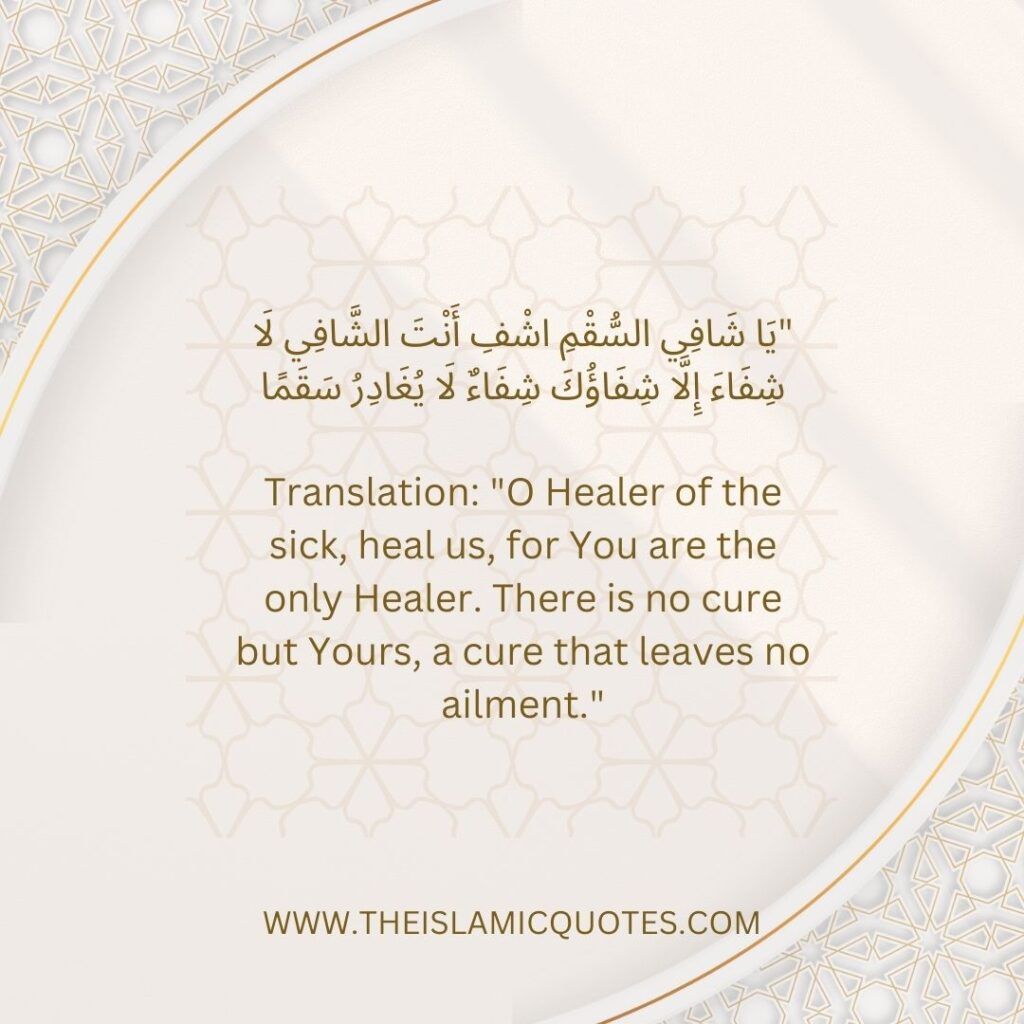
Dua for shifa, which translates to prayer for healing, is one of the most common prayers for when someone is ill.
When we say this prayer, we ask Allah to heal us or our family members when we are not feeling well.
This prayer tells Allah that we believe in him and that he can heal us and make us strong again. But remember, having tawakkul is as important as reciting these duas.
It reminds us that Allah can heal us and that he can make us healthy. This prayer gives us hope and peace when we are not well.
2 – Dua for Patience and Recovery:
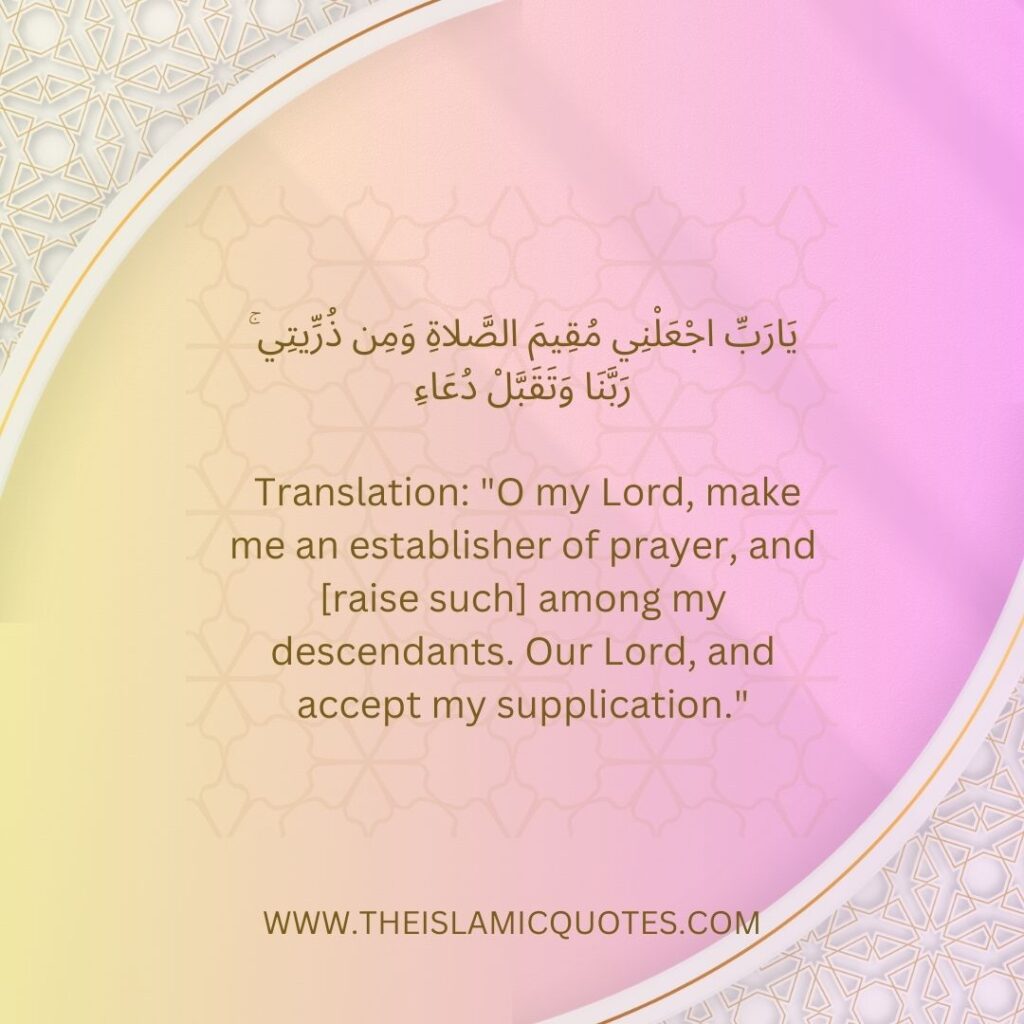
When times get tough, it’s a good idea to say a special prayer called Dua for Patience and Recovery.
We ask Allah to give us the strength to stay patient and to help us get better even when we don’t feel like it.
This prayer reminds us to stay strong and hopeful, and it’s like saying, “Help us be patient, and we’ll get well again.” It’s like a comforting blanket when times get tough.
3 – Dua for Ease and Strength:

When life gets tough, it’s a good idea to say a special prayer to Allah to remind us that Allah can make things better.
It’s like saying, “Please make things less difficult and give me the strength to be strong.”
4 – Du’a for Pain Relief:

This dua is our way of seeking comfort and asking for help when we’re not feeling well. It’s a reminder that Allah cares about us, and He can make us feel better.
5 – Dua When Visiting the Sick:

When we visit a sick person, we say this special prayer, asking Allah to make them feel better.
This dua is a kind and comforting gesture that reminds us of the importance of compassion and prayers in times of illness.
Duas in Islam are like private conversations with Allah. When we or someone close to us gets sick, these Duas are like a ray of hope and strength.
They remind us that Allah is always with us, even when times get tough . Duas aren’t just words, they hold the strength of faith and a sense of connection.
As a Muslim, praying these Duas during illness can be a great way to strengthen our connection with Allah and find solace in our faith.
Let these prayers bring peace, patience, healing, and strength to those who are sick, and let Allah hear our prayers and show us His mercy.
Related Posts

9 Islamic Quotes on Dajjal and How to Protect Ourselves

20 Short And Easy Duas That Muslims Should Recite Every Day

20 Important Duas from Quran for Every Situation & Need

Symptoms Of Evil Eye In Islam – How To Remove Nazar In Islam

Complete Duas for the Start and End of Hijrah Year

40 Rabbana Duas – Quranic Duas That Start with Rabbana
About the author.
One Response
How to contact you ). I saw one post on Pinterest, Imam talked about i jury. talk with me)). have a nice time brother. Assalomu alaykum

Islam The Ultimate Peace
Dua when visiting a sick

<1 min read
أَسْـأَلُ اللهَ العَـظيـم، رَبَّ العَـرْشِ العَـظيـم أَنْ يَشْفـيك
Listen the Dua Here:
Transliteration:As’alullhal Azima Rabbal - Arshil-Azima an yashfiyak.
Translation: I ask Almighty Allah, Lord of the Magnificent Throne, to make you well. (Recite seven times in Arabic .)
Reference: At-Tirmidhi, Abu Dawud. See also Al-Albani, Sahih At-Tirmidhi 2/210 and Sahihul-Jami’ As-Saghir 5/180.
Hisn al-Muslim 148
You may also like...

Dua upon entering a town or village
October 22, 2022
by itupnetwork · Published October 22, 2022

Unlocking the Secrets of Stress Relief: A Guide to Using Islamic Principles and Practices for a Calmer Mind and Soul
January 21, 2023
by itupnetwork · Published January 21, 2023

3 Dua of Prophet Ibrahim
September 12, 2022
by itupnetwork · Published September 12, 2022 · Last modified August 13, 2023
- Next story Sunnah Dua after prayer which opens door of sustenance
- Previous story Top 15 things to do before going to Umrah
- Recent Posts
- Popular Posts
- Recent Comments

Hajj & Umrah
How to Prepare Yourself for Hajj?
April 30, 2024

Entrepreneurship
10 Ways for Muslims to Earn Halal Money with AI
April 13, 2024

10 Ways to Maximize the Last 10 Nights of Ramadan
March 30, 2024

How to make the best use of Last 10 nights of Ramadan?
March 27, 2024
Guide to Prepare for Ramadan: Embracing Spiritual Growth and Wellness
February 25, 2024

Others / Resources
What is the Psychology of wealth in Islam?
November 9, 2021

Others / Women
How to Get Married in Islam? A Step-by-Step Guide
December 14, 2021

5 Unique Ways Muslim ladies can Increase Their Rewards
September 29, 2021

Moroccan football star Hakim Zayech has never taken a single dollar
December 15, 2022

Dua (Supplication)
The Sunnah and Etiquettes of Making Dua
September 9, 2021
- 3 Main Business strategies of Abdur Rahman Ibn Awf (RA) 5 Islamic Principles to be a successful entrepreneur 10 Easy Sunnah Muslims Should Follow Daily ashara mubashara Ayatul Kursi benefits of doing Dua benefits of reciting surah al mulk business that are haram in islamic finance daily sunnah dua Dua before going to sleep dua for suhoor dua in sunnah way Dua to do in the morning and evening everyday sunnah haram business How many times a Muslim need to pray everyday? How many times Muslims pray per day? how to make dua that Allah accepts? hw to make dua? ihram importance of making dua islamic business Istighfar muslim entrepreneur ottoman empire propmised jannah for 10 sahaba ramadan rewards f reading the quran rich sayyidul istighfar Seven industries that are prohibited in Islamic Finance sunnah surah al mulk tahajjud The 10 Companions who are promised Jannah The History of Ottoman Empire The Sunnah and Etiquettes of Making Dua top 5 benefits of reciting the quran Top 5 English Islamic youtube channel to subscribe Two Dua to settle your debt umrah why should I recite surah mulk at night? why should we read quran zakat

The istighfar of the Sahabah

What is Al-Mu’awwidhatayn?

How to build a successful career as a Muslim Guided by the Quran & Sunnah?

Top 10 Best time for making Dua
Quote of the Day
You are here: Home Duas Dua when visiting the sick
Dua when visiting the sick

Ibn Abbas, Allah be pleased with him narrates that the Prophet, Allah send peace and blessings be upon him visited a sick Bedouin. Whenever he visited someone sick he would say
No harm will afflict you, it is a means of purification by Allah’s will
و عن ابن عباس أن النبي صلى الله عليه وسلم الله عليه وسلم صلى الله عليه وسلم دخل علي أعرأبي يعوده وكان إذا دخل علي من يعوده قال:
لَا بَأْسَ طَهُوْرٌ إِنْ شَاءَ اللهُ
(رواه البخاري، كتاب عيادة المريض وتشييع الميت والصلاة عليه وحضور دفنه المكث عند قبره بعد دفنه)

You Might also like

Join Our Mailing List

Most Popular
- How to make up missed Salah
- Dua for congratulating a newly wed
- Dua when starting Tahajjud

Recent Posts
Takbīr al-Tashrīq FAQs
ADVICE TO STUDENTS
If one possesses knowledge, but there is no a…
Learn to protect your good deeds by carrying them out with sincer…

- Ask A Mufti
- Terminology
- Zakat Calculator

- Privacy Policy |
- Useful Links |
- Sitemap |


Duas for Sick Persons to Have Cure; via the Holy Quran and Hadiths
- Posted by Khizra Zaheer
- On January 11, 2022
- In Islam , Modesty

Allah (SWT) has given us all the guidance through the Holy Quran and Hadiths for all aspects of life. One of the essential elements of life is health and well-being and both the Holy Quran and Hadiths taught us to take care of these things. From both sources, we get several duas for sick persons to have cure from illness.
Life puts us several times in a condition of illness due to several reasons including the weather, allergies, and more.
Everything that comes in our life is a blessing and Prophet Muhammad (PBUH) reassured the whole ummah that Allah will expiate some of the sins of a sick person.
Abu Sa’eed al-Khudri and Abu Hurayrah (RA) reported that the Prophet (SAW) said:
No tiredness, exhaustion, worry, grief, distress, or harm befalls a believer in this world, not even a thorn that pricks him, but Allah expiates some of his sins thereby.
(Sahih Al-Bukhari)
It is always said that prevention is better than cure. However, when we get sick we look for the best cure.
The Prophet (SAW) said:
Allah has sent down the disease and the cure and has made for every disease the cure.
(Sunan Abi Daud)
Under this blog, we are stating here some Duas that we can recite when we are sick and when visiting the sick:
1) Dua for healing
Along with the medical attention, we should also pray to Almighty Allah to ask for recovery from Him. He is the one who gives us illness and cure us well.
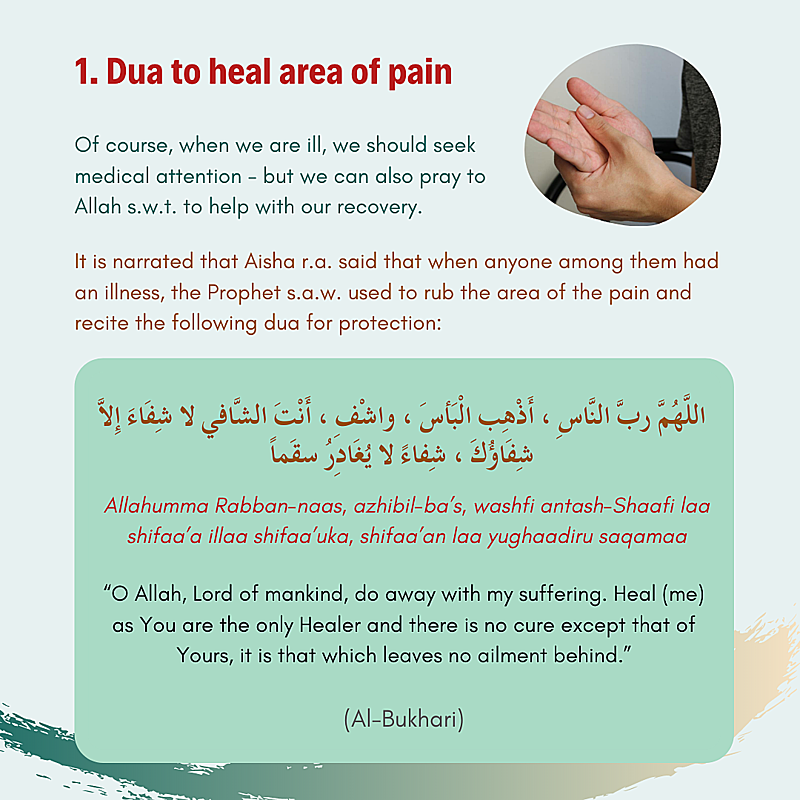
It is narrated that Aisha (RA) said that when anyone among them had an illness, the Prophet s.a.w. used to rub the area of the pain and recite the following dua for protection:
اللَّهُمَّ ربَّ النَّاسِ ، أَذْهِب الْبَأسَ ، واشْفِ ، أَنْتَ الشَّافي لا شِفَاءَ إِلاَّ شِفَاؤُكَ ، شِفاءً لا يُغَادِرُ سقَماً
Allahumma Rabban-naas, azhibil-ba’s, washfi antash-Shaafi laa shifaa’a illaa shifaa’uka, shifaa’an laa yughaadiru saqamaa
“O Allah, Lord of mankind, do away with my suffering. Heal (me) as You are the only Healer and there is no cure except that of Yours, it is that which leaves no ailment behind”
(Al-Bukhari)
2) Dua for pain relief
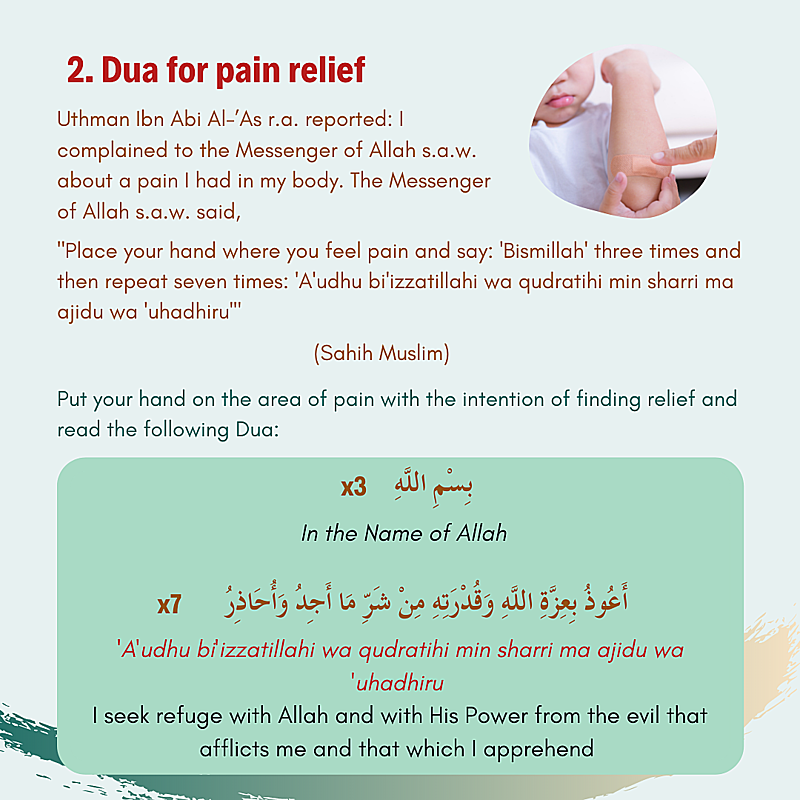
One of the Hadiths from Uthman Ibn Abi Al-’As (RA) reported:
I complained to the Messenger of Allah s.a.w. about a pain I had in my body. The Messenger of Allah s.a.w. said, “Place your hand where you feel pain and say: ‘Bismillah (In the Name of Allah)’ three times; and then repeat seven times: ‘A’udhu bi’izzatillahi wa qudratihi min sharri ma ajidu wa ‘uhadhiru (I seek refuge with Allah and with His Power from the evil that afflicts me and that which I apprehend).”
(Sahih Muslim)
Put a hand on the area of pain with the intention to find relief and then recite the following:
بِسْمِ اللَّهِ
In the Name of Allah
أَعُوذُ بِعِزَّةِ اللَّهِ وَقُدْرَتِهِ مِنْ شَرِّ مَا أَجِدُ وَأُحَاذِرُ
‘A’udhu bi’izzatillahi wa qudratihi min sharri ma ajidu wa ‘uhadhiru
I seek refuge with Allah and with His Power from the evil that afflicts me and that which I apprehend.
3) Duas for sick persons
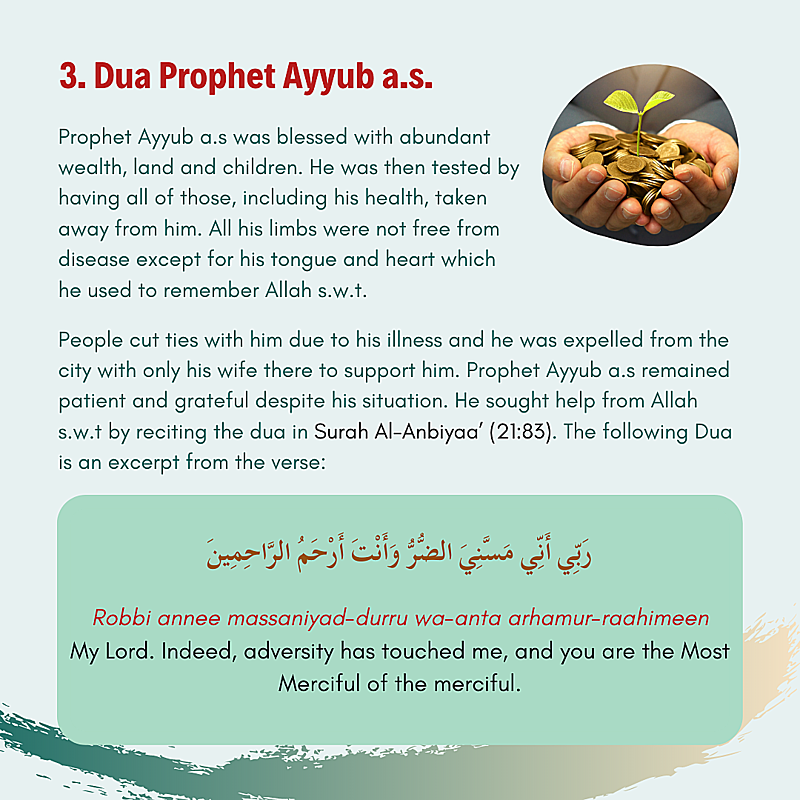
Prophet Ayyub a.s was blessed with abundant wealth, land and children. He was then tested by having all of those, including his health, taken away from him. All his limbs were not free from disease except for his tongue and heart which he used to remember Allah s.w.t.
People cut ties with him due to his illness and he was expelled from the city with only his wife who was there to support him. Prophet Ayyub a.s remained patient and grateful despite his situation. He sought help from Allah s.w.t by reciting the dua in Surah Al-Anbiyaa’
The following Dua is an excerpt from the verse:
رَبِّي أَنِّي مَسَّنِيَ الضُّرُّ وَأَنْتَ أَرْحَمُ الرَّاحِمِينَ
Robbi annee massaniyad-durru wa-anta arhamur-raahimeen
My Lord. Indeed, adversity has touched me, and you are the Most Merciful of the merciful.
4) Dua for severe sickness
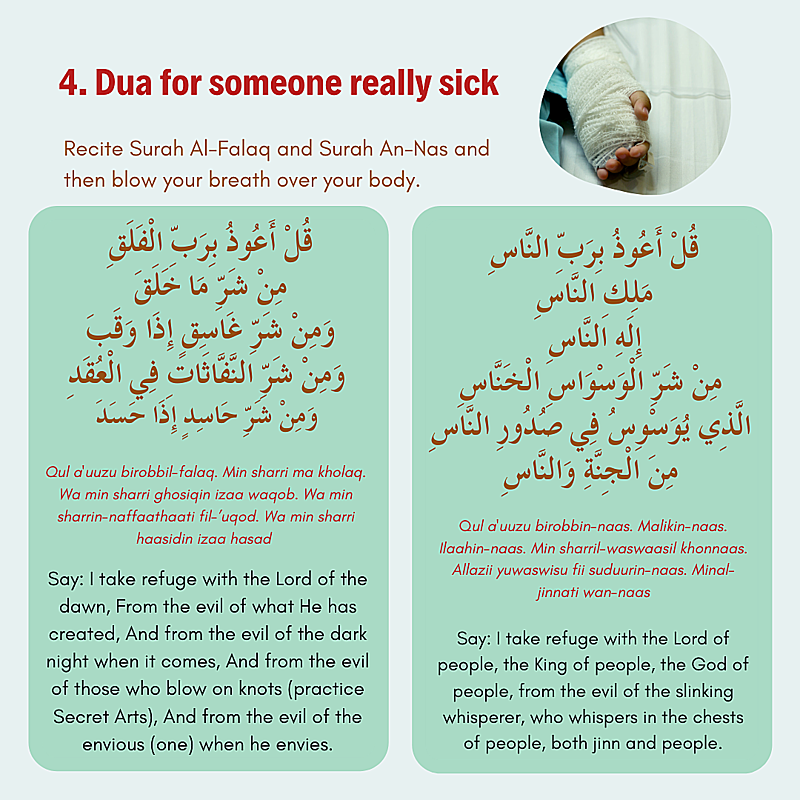
We often feel helpless when we visit sick persons either in our family or relatives. In this situation, try to remember that Allah is Ash-Shaafee (The One who cures, The Healer).
Aisyah (RA) reported that:
Whenever Allah’s Messenger s.a.w. became sick, he would recite the Mu’awwidhatayn (Surah Al-Falaq and Surah An- Nas) and then blow his breath over his body. When he became seriously ill, I (Aisyah r.a.) used to recite (these two Surahs) and rub his hands over his body hoping for its blessings.
5) Dua for asking mercy, and forgiveness
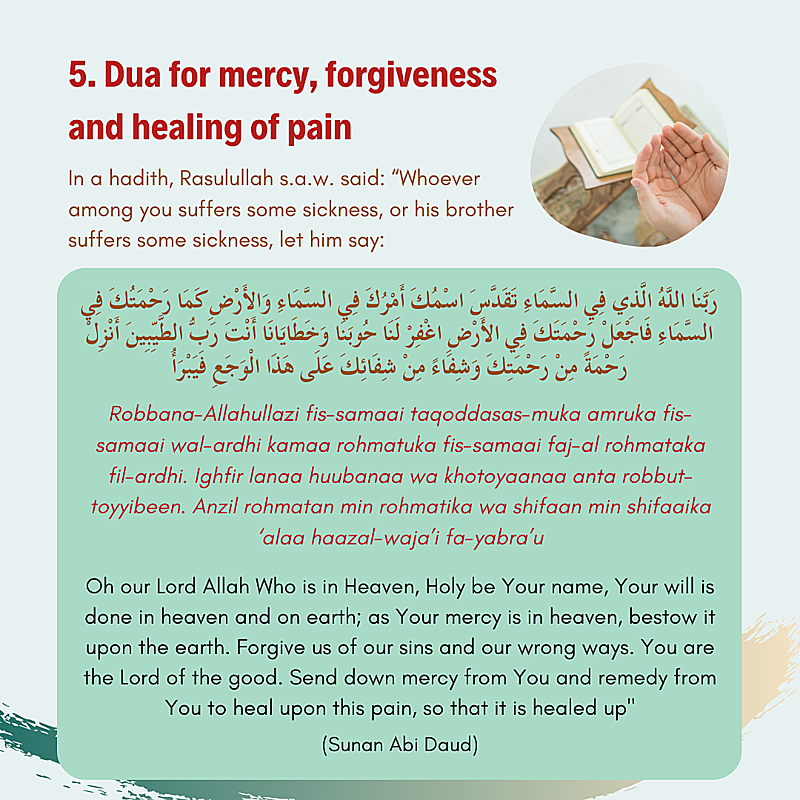
Rasulullah SAW said: “Whoever among you suffers some sickness, or his brother suffers some sickness, let him say:
رَ بَّنَا اللَّهُ الَّذِي فِي السَّمَاءِ تَقَدَّسَ اسْمُكَ أَمْرُكَ فِي السَّمَاءِ وَالأَرْضِ كَمَا رَحْمَتُكَ فِي السَّمَاءِ فَاجْعَلْ رَحْمَتَكَ فِي الأَرْضِ اغْفِرْ لَنَا حُوبَنَا وَخَطَايَانَا أَنْتَ رَبُّ الطَّيِّبِينَ أَنْزِلْ رَحْمَةً مِنْ رَحْمَتِكَ وَشِفَاءً مِنْ شِفَائِكَ عَلَى هَذَا الْوَجَعِ فَيَبْرَأُ
Oh our Lord Allah Who is in Heaven, Holy be Your name, Your will is done in heaven and on earth; as Your mercy is in heaven, bestow it upon the earth. Forgive us of our sins and our wrong ways. You are the Lord of the good. Send down mercy from You and remedy from You to heal upon this pain, so that it is healed up”
Robbana-Allahullazi fis-samaai taqoddasas-muka amruka fis-samaai wal-ardhi kamaa rohmatuka fis-samaai faj-al rohmataka fil-ardhi. Ighfir lanaa huubanaa wa khotoyaanaa anta robbut-toyyibeen. Anzil rohmatan min rohmatika wa shifaan min shifaaika ‘alaa haazal-waja’i fa-yabra’u
6) Dua at the time of visiting the sick
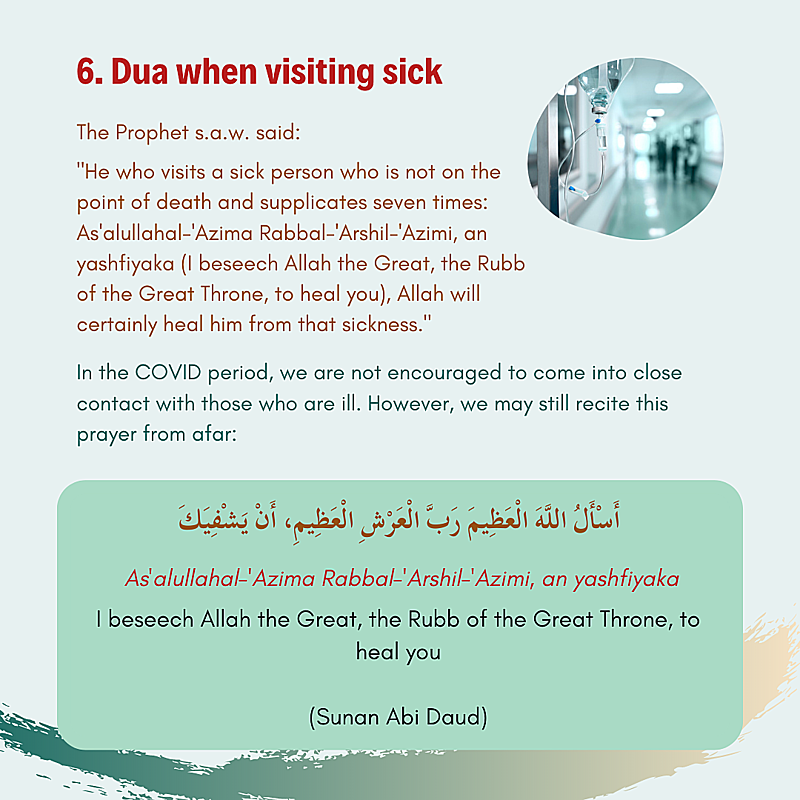
At different times, we are required to visit the people who are ill. In this era of Covid-19, we are restricted to visit the people suffering from the virus. However, we can recite this dua and say a prayer from distance.
The Prophet SAW said:
“He who visits a sick person who is not on the point of death and supplicates seven times:
As’alullahal-‘Azima Rabbal-‘Arshil-‘Azimi, an yashfiyaka
(I beseech Allah the Great, the Rubb of the Great Throne, to heal you),
Allah will certainly heal him from that sickness.”
This was the post on duas for sick persons to recite and get mercy from the Almighty Allah. May we always remain in the protection of Allah and get rid of this pandemic really soon. Aameen.
We always welcome your opinions here, so if you have any thoughts to share then write to us at Muslimkits.
Related Posts
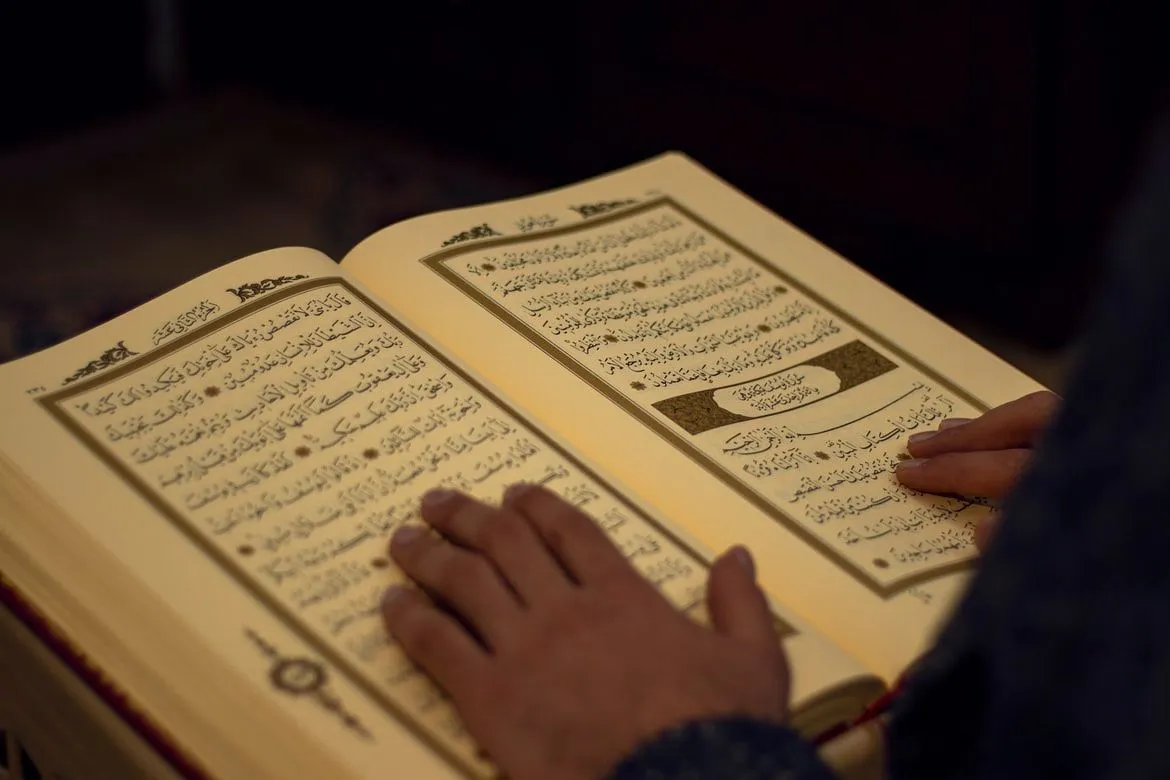
7 Surahs of the Holy Quran to Recite Everyday

Importance of Muharram in the Light of Quran

10 Best Duas for the 10 days of Dhul Hijjah

6 Places To Visit During Hajj Pilgrimage; Revitalizing Your Spirituality
- Accessories & Lighting
- Cushion Covers
- Landscapes, Mosques, Holy Sites
- Quranic Verses, Ayats & Surahs
- Islamic Wall Stickers
- Kid’s Bedroom
- Hajj & Umrah
- Party Supplies
- Arabic Toys
- Gadgets and Tech
- Islamic Phone Covers
- Unique Gifts and More
- Men’s Accessories
- Watches and Jewellery
- Modest Wear (Hijabs and more)
- Freebies for New Muslims
- Prayer Mats
- Quran Accessories
- Hijab & Hijab Accessories
- Prayer Beads
What are you looking for?
- Albalagh.net
- AnswersToFatawa
- Arij Canada
- Askimam.org
- Askmufti.co.za
- AskOurImam.com
- CouncilofUlama.co.za
- Darulfiqh.com
- Darulifta Azaadville
- Darulifta Deoband Waqf
- Darulifta-Deoband.com
- Daruliftaa.com
- DaruliftaaMW.com
- DaruliftaaZambia.com
- DarulIftaBirmingham
- Darulihsan.com
- DarulUloomTT.net
- Fatwa-TT.com
- Fatwa.org.au
- FatwaCentre.org
- HadithAnswers.com
- IslamicPortal.co.uk
- IslamicSolutions.org
- Jamia Binoria
- Mahmoodiyah
- Mathabah.org
- Muftionline.co.za
- Muftisays.com
- MuslimaCoaching.com
- Seekersguidance.org
- ShariahBoard.org
- Tafseer Raheemi
- TheMufti.com
- ZamzamAcademy.com
- BinBayyah.net
- Darul Iftaa Jordan
- Shafiifiqh.com
- HanbaliDisciples.com
- TheHanbaliMadhhab.com
- Ask Question
- Lailatul Qadr

Home » Hanafi Fiqh » AnswersToFatawa » Dua of a sick person
Related Q&A
- Those who visit the sick will receive a garden in Jannah
- A narration explaining a huge reward for visiting a sick person
- Unreliable virtue of visiting the sick
- A du’a to recite when visiting the sick
- RULING OF A SICK PERSON WHO CANNOT FACE THE QIBLA WHEN PERFORMING SALAH?
- An unauthentic narration on feeding a sick person
Dua of a sick person
Asalaam aleikum mufti saheb,
There is one hadith (cant remember exactly which one), whereby we are told that the dua of a sick person is the same as the dua of the angels; thus we are encouraged to ask sick people to pray for us.
My question is: what exactly does ‘ sick person’ mean in this hadith? Does it mean like someone who has a temporary sickness like fever or malaria OR does this also include people with (long period/permanent) chronic sicknesses like diabetics, blood pressure problems, hernia, heart problems, epilepsy,etc?
Thanks for your much appreciated work. I pray for you all. Waaleikum salaam warahmatullahi wa barakatu.
In the Name of Allah, the Most Gracious, the Most Merciful.
As-salāmu ‘alaykum wa-rahmatullāhi wa-barakātuh.
The hadith that you refer to is as follows:
عَنْ عُمَرَ بْنِ الْخَطَّابِ، قَالَ: قَالَ لِي رسول الله – صَلَّى اللَّهُ عَلَيْهِ وَسَلَّمَ -: “إِذَا دَخَلْتَ عَلَى مَرِيضٍ فَمُرْهُ أَنْ يَدْعُوَ لَكَ، فَإِنَّ دُعَاءَهُ كَدُعَاءِ الْمَلَائِكَةِ
سنن ابن ماجه ت الأرنؤوط (2/ 435)
“Umar bin Al-Khattab narrates : “The Prophet (sallallahu alayhi wa sallam) said to me: ‘When you enter upon one who is sick, tell him to pray for you, for his supplication is like the supplication of the angels.’” (Sunan Ibn Majah, v2, pg435)
This narration talks about general sickness and therefore it is hoped that people with all types of sicknesses are included in this virtue [1] .
And Allah Ta’āla Knows Best
Hafizurrahman Fatehmahomed
Student Darul Iftaa Netherlands
Checked and Approved by, Mufti Ebrahim Desai.
سنن ابن ماجه ت الأرنؤوط ( 2 / 435 )
إسناده ضعيف لانقطاعه، فإن ميمون بن مهران لم يدرك عمر بن الخطاب وقد خالف جعفرَ بن مسافر في روايته الحسنُ بن عرفة، فرواه عن كثير بن هشام عن عيسى بن إبراهيم الهاشمي، عن جعفر بن بُرقان، فزاد عيسى بن إبراهيم بين كثير وبين جعفر، وعيسى هذا منكر الحديث، وتصريح كثير بسماعه من ابن برقان عند المصنف من أوهام جعفر بن مسافر فيما يغلب على ظننا، والله أعلم. وانظر كلام الحافظ ابن حجر في “تهذيب التهذيب” في ترجمة جعفر بن مسافر .
حاشية السندي على سنن ابن ماجه ( 1 / 440 )
قَوْلُهُ: (فَمُرْهُ) أَيِ الْتَمِسْ مِنْهُ الدُّعَاءَ (كَدُعَاءِ الْمَلَائِكَةِ) فِي قُرْبِ الِاسْتِجَابَةِ وَفِي الزَّوَائِدِ إِسْنَادُهُ صَحِيحٌ وَرِجَالُهُ ثِقَاتٌ إِلَّا أَنَّهُ مُنْقَطِعٌ قَالَ الْعَلَامِيُّ فِي الْمَرَاسِيلِ وَالْمِزِّيُّ فِي رِوَايَةِ مَيْمُونِ بْنِ مَهْرَانَ عَنْ عُمَرَ ثَلْمَةُ اهـ وَفِي الْأَذْكَارِ لِلنَّوَوِيِّ مَيْمُونُ لَمْ يُدْرِكْ عُمَرَ .
مصباح الزجاجة في زوائد ابن ماجه ( 2 / 21 )
هَذَا إِسْنَاد رِجَاله ثِقَات إِلَّا أَنه مُنْقَطع قَالَ العلائي فِي الْمَرَاسِيل والمزي فِي التَّهْذِيب أَن رِوَايَة مَيْمُون بن مهْرَان عَن عمر مُرْسلَة
عمل اليوم والليلة لابن السني (ص: 507)
أَخْبَرَنَا إِبْرَاهِيمُ بْنُ مُحَمَّدِ بْنِ عِيسَى التَّمَّارُ، حَدَّثَنَا الْحَسَنُ بْنُ عَرَفَةَ، ثنا كَثِيرُ بْنُ هِشَامٍ الْجَزَرِيُّ، عَنْ عِيسَى بْنِ إِبْرَاهِيمَ الْهَاشِمِيِّ، عَنْ جَعْفَرِ بْنِ بُرْقَانَ، عَنْ مَيْمُونِ بْنِ مِهْرَانَ، عَنْ عُمَرَ بْنِ الْخَطَّابِ، رَضِيَ اللَّهُ عَنْهُ [ص:508] قَالَ: قَالَ رَسُولُ اللَّهِ صَلَّى اللهُ عَلَيْهِ وَسَلَّمَ: «إِذَا دَخَلْتَ عَلَى مَرِيضٍ، فَمُرْهُ فَلْيَدْعُ لَكَ؛ فَإِنَّ دُعَاءَهُ كَدُعَاءِ الْمَلَائِكَةِ »
مرعاة المفاتيح شرح مشكاة المصابيح ( 5 / 278 )
قوله: (فمره يدعوا لك) أي التمس منه الدعاء. قال المناوي: قوله يدعو لك مفعول بإضمار “أن” أي مره بأن يدعو لك، قال الطيبي أي مره يدعو لك لأنه خرج عن الذنوب (فإن دعاءه كدعاء الملائكة) أي في قرب الاستجابة. وقال الطيبي: إنما يؤمر بالدعاء حينئذ، لأنه نقي من الذنوب كيوم ولدته أمه وصار معصوماً كالملائكة ودعاء المعصوم مقبول. وقال العلقمي: في الحديث استحباب طلب الدعاء من المريض، لأنه مضطر ودعاءه أسرع إجابة من غيره، ففي السنة أقرب الدعاء إلى الله إجابة دعوة المضطر (رواه ابن ماجه) في الجنائز وأخرجه أيضاً ابن السني في اليوم والليلة (178) قال البوصيري في الزوائد: إسناده صحيح، ورجاله ثقات إلا أنه منقطع. قال العلائي في المراسيل والمزي في رواية ميمون بن مهران عن عمر ثلمة- انتهى. وقال النووي في الأذكار: ميمون لم يدرك عمر. وقال المنذري رواته ثقات مشهورون إلا أن ابن ميمون بن مهران لم يسمع من عمر- انتهى. وفي الباب عن أنس عند الطبراني في الأوسط، وفيه عبد الرحمن بن قيس الضبي، وهو متروك الحديث .
التنوير شرح الجامع الصغير ( 2 / 42 )
(إذا دخلت على مريض فمره) أي أطلب منه (يدعوا لك) هذا إذا كان عنده نشاط وقدرة على ذلك وإلا فإن التثقيل على المريض منهي عنه (فإن دعاؤه كدعاء الملائكة) مقبول لأنهم معصومون ولأنهم لا يدعون إلا لمن أذن لهم بالدعاء له ولا يؤذن لهم إلا بدعاء مجاب
مرقاة المفاتيح شرح مشكاة المصابيح ( 3 / 1152 )
« إِذَا دَخَلْتَ عَلَى مَرِيضٍ فَمُرْهُ يَدْعُو لَكَ» ) : قَالَ الطِّيبِيُّ: أَيْ: مُرْهُ يَدْعُو لَكَ ; لِأَنَّهُ خَرَجَ عَنِ الذُّنُوبِ، وَأَمَّا قَوْلُ ابْنِ حَجَرٍ: وَيَصِحُّ جَزْمُهُ عَلَى لُغَةِ مَنْ لَا يَحْذِفُ حَرْفَ الْعِلَّةِ لِلْجَازِمِ جَوَابًا لِلْأَمْرِ الْوَاصِلِ إِلَيْهِ عَنْهُ – عَلَيْهِ الصَّلَاةُ وَالسَّلَامُ – عَلَى حَدِّ: {قُلْ لِعِبَادِيَ الَّذِينَ آمَنُوا يُقِيمُوا الصَّلَاةَ} [إبراهيم: 31] عَلَى أَحَدِ الْأَعَارِيبِ فِيهِ فَبَعِيدٌ جِدًّا، لِعَدَمِ ظُهُورِ السَّبَبِيَّةِ، وَإِنَّمَا تَكَلَّفَ بَعْضُهُمْ فِي الْآيَةِ لَهَا لِصَرَاحَةِ الْجَزْمِ، وَأَمَّا أَنَّهُ يَتَكَلَّفُ الْجَزْمَ لِيَتَكَلَّفَ السَّبَبَ النَّاشِئَ عَنْ تَكَلُّفِهِ السَّبَبَ الْعَادِيَّ، فَغَيْرُ صَحِيحٍ. (فَإِنَّ دُعَاءَهُ كَدُعَاءِ الْمَلَائِكَةِ) : لِأَنَّهُ أَشْبَهَهُمْ فِي التَّنَقِّي مِنَ الذُّنُوبِ، أَوْ فِي دَوَامِ الذِّكْرِ .
اس حدیث پاک میں مریض کی دعا فرشتوں کی دعا کے ساتہ مشابہت دی گئ ہے اس لیے کہ بیمار آدمی گناہوں سے بچنے کی وجہ سے فرشتوں کے ساتہ مشابہت رکہتا ہے- کیونکہ جس طرح فرشتے گناہوں سے بچتے رہتے ہیں اسی طرح بیمار آدمی بہی گنا ہوں سے بچتے رہتے ہیں ۔ یہ جس طرح فرشتے ہمیشہ اللہ کو یاد کرتے رہتے ہیں ۔ اسی طرح بیمار آدمی بہی اللہ تعالی کی یاد میں لگا رہتا ہے اور خدا سے آہوزاری اور التجا کرنے میں ہمیشہ مصروف رہتا ہے ۔ کیونکے وہ بماری کی وجہ سے ہر وقت اللہ کو یاد کرتا رہتا ہے۔۔۔انہی وجوہات کی بنا پر اس کی دعا فرشتوں کی دعا کے ساتہ مشابہت رکہتی ہے –(مظاہر حق، ج2، ص73 )
بیمار کو چاہئے کہ وہ ہر وقت اپنے لۓ اور اپنے رشتداروں کے لۓ اور عام مسلمانوں کے لۓ دعا کیا کریں اور عیادت کرنے والوں کو بہی چاہئے کہ ان سے دعا کراۓ کیونکہ وہ اپنے مخصوص احوال کے ذریعہ سے فرشتوں کے قریب بہی ہو گیا ہے اور ان سے مشابہ ہے اسلے ان کی دعا فرشتوں کی طرح مقبول ہے (توضیحات، ج3، ص 261 )
________________________
صحيح مسلم ( 2 / 633 )
عَنْ أُمِّ سَلَمَةَ، قَالَتْ: قَالَ رَسُولُ اللهِ صَلَّى اللهُ عَلَيْهِ وَسَلَّمَ: «إِذَا حَضَرْتُمُ الْمَرِيضَ، أَوِ الْمَيِّتَ، فَقُولُوا خَيْرًا، فَإِنَّ الْمَلَائِكَةَ يُؤَمِّنُونَ عَلَى مَا تَقُولُونَ »
شرح النووي على مسلم ( 6 / 222 )
قَوْلُهُ صَلَّى اللَّهُ عَلَيْهِ وَسَلَّمَ إِذَا حَضَرْتُمُ الْمَرِيضَ أَوِ الْمَيِّتَ فَقُولُوا خَيْرًا فَإِنَّ الْمَلَائِكَةَ يُؤَمِّنُونَ عَلَى مَا تَقُولُونَ فِيهِ النَّدْبُ إِلَى قَوْلِ الْخَيْرِ حِينَئِذٍ مِنَ الدُّعَاءِ وَالِاسْتِغْفَارِ لَهُ وَطَلَبِ اللُّطْفِ بِهِ وَالتَّخْفِيفِ عَنْهُ وَنَحْوِهِ وَفِيهِ حضور الملائكة حينئذ وتأمينهم
ذخيرة العقبى في شرح المجتبى ( 18 / 221 )
(عَنْ أُمِّ سَلَمَةَ) – رضي اللَّه عنها -، أنها (قَالَت: سَمِعْتُ رَسُولَ اللَّهِ – صلى اللَّه عليه وسلم -، يَقُولُ: “إِذا حَضَرْتُمُ الميت) وكذا هو في رواية أبي داود، والبيهقيّ، وفي بعض النسخ: “إذا حضرتم المريض”، ولفظ مسلم: “إذا حضرتم المريض، أو الميت”، (فَقُولُوا. خَيْرًا) قال السنديّ -رحمه اللَّه تعالى-: أي ادعوا له بالخير، لا بالشرّ، أو ادعوا بالخير مطلقًا، لا بالويل، ونحوه، والأمر فيه للندب، ويحتمل أن المراد: فلا تقولوا شرّا، فالمقصود النهي عن الشرّ بطريق الكناية، لا الأمر بالخير انتهى .
وقال المظهر: أي ادعوا للمريض بالشفاء، وقولوا: اللَّهم اشفه، وللميت بالرحمة والمغفرة، وقولوا: اللَّهم اغفر له، وارحمه انتهى .
مرقاة المفاتيح شرح مشكاة المصابيح ( 3 / 1166 )
(وَعَنْ أُمِّ سَلَمَةَ قَالَتْ: قَالَ رَسُولُ اللَّهِ – صَلَّى اللَّهُ عَلَيْهِ وَسَلَّمَ -: ” «إِذَا حَضَرْتُمُ الْمَرِيضَ أَوِ الْمَيِّتَ» ) أَيِ: الْحُكْمِيَّ فَأَوْ لِلشَّكِّ، أَوِ الْحَقِيقِيَّ، فَأَوْ لِلتَّنْوِيعِ، وَلَا وَجْهَ لِمَا جَزَمَ بِهِ ابْنُ حَجَرٍ مِنْ أَنَّهَا لِلشَّكِّ، وَالْمُرَادُ مِنَ الثَّانِي هُوَ الْأَوَّلُ. (فَقُولُوا خَيْرًا) أَيْ: لِلْمَرِيضِ اشْفِهِ، وَلِلْمَيِّتِ اغْفِرْ لَهُ ذَكَرَهُ الْمُظْهِرُ أَوْ لَكُمْ بِالْخَيْرِ، أَوْ قُولُوا لِلْمُحْتَضَرِ: لَا إِلَهَ إِلَّا اللَّهُ ; فَإِنَّهَا خَيْرُ مَا يُقَالُ لَهُ اخْتَارَهُ ابْنُ حَجَرٍ لَكِنْ لَا يُلَائِمُهُ قَوْلُهُ: (فَإِنَّ الْمَلَائِكَةَ يُؤَمِّنُونَ) بِالتَّشْدِيدِ أَيْ: يَقُولُونَ آمِينَ. (عَلَى مَا تَقُولُونَ) أَيْ: مِنَ الدُّعَاءِ خَيْرًا أَوْ شَرًّا، وَقَالَ ابْنُ حَجَرٍ: أَيْ: مِنَ الْأَدْعِيَةِ الصَّالِحَةِ فَعَلَيْهِ تَرْغِيبٌ وَعَلَى الْأَوَّلِ زِيَادَةُ تَرْهِيبٍ. (رَوَاهُ مُسْلِمٌ) قَالَ مِيرَكُ: وَكَذَا الْأَرْبَعَةُ .
شرح المصابيح لابن الملك ( 2 / 337 )
“ وعن أم سلمة أنها قالت: قال رسول الله صلى الله تعالى عليه وسلم: إذا حضرتم المريض أو الميت فقولوا خيراً”؛ أي: ادعوا للمريض بالشفاء بقولكم: اللهم اشفه، وللميت بالرحمة والمغفرة بقولكم: اللهم اغفر له وارحمه .
“ فإن الملائكة يؤمنون على ما تقولون” فيكون دعاؤكم مستجاباً بحضور الملائكة وتأمينهم .
حاشية السندي على سنن ابن ماجه ( 1 / 442 )
قَوْلُهُ: (إِذَا حُضِرَ) عَلَى بِنَاءِ الْمَفْعُولِ أَيْ إِذَا حَضَرَهُ مُقَدِّمَاتُ الْمَوْتِ أَوْ مَلَائِكَتُهُ .
قَوْلُهُ: (فَقُولُوا خَيْرًا) أَيِ ادْعُوَا لَهُ بِالْخَيْرِ لَا بِالشَّرِّ أَوِ ادْعُوَا بِالْخَيْرِ مُطْلَقًا لَا بِالْوَيْلِ وَنَحْوِهِ وَالْأَمْرُ لِلنَّدَبِ وَيَحْتَمِلُ أَنَّ الْمُرَادَ فَلَا تَقُولُوا شَرًّا فَالْمَقْصُودُ النَّهْيُ عَنِ الشَّرِّ بِطَرِيقِ الْكِنَايَةِ لَا الْأَمْرُ بِالْخَيْرِ قَوْلُهُ: (فَإِنَّ الْمَلَائِكَةَ) أَيْ مَلَكَ الْمَوْتِ وَأَعْوَانَهُ أَوْ غَيْرَهُ (يُؤَمِّنُونَ) مِنَ التَّأْمِينِ (وَأَعْقَبَنِي) مِنَ الْإِعْقَابِ أَيْ بَدَّلَنِي وَعَوَّضَنِي (مِنْهُ) أَيْ فِي مُقَابَلَتِهِ (عُقْبَى) كَبُشْرَى أَيْ بَدَلًا صَالِحًا
This answer was collected from AnswersToFatawa.com , which no longer exists. It was established by Moulana Hafizurrahman Fatehmahomed . He graduated from Jamiatul Ilm Wal Huda, Blackburn, UK with a distinction in Alimiyyah degree. He thereafter traveled to Darul Iftaa Mahmudiyyah, Durban, South Africa , to train as a Mufti under Mufti Ebrahim Desai (rah) and Mufti Husain Kadodia.
Read answers with similar topics:
Random Q&A
Being possessive over one’s wife, should one perform qasr or full rakats if arriving at sunset, shaafi mazhab’s stance on moza khuffain socks, non-rental apartment isn`t liable for zakah, imam ibn shihab zuhri (rahimahullah), if i am a person’s mawla, ‘ali is also his mawla, more answers….
- Is it permissible to lease a hotel room for two hours
- What is our belief about Allah ( Pure and Exalted is He) in general?
- Why do people look down upon women who cannot conceive
- Can we keep the names of our baby boy “Nihan”, “Mursalin” or “Murtafi”?
- Is it permissible to takeout a Medical insurance
- Does blood experienced during labour prevent a woman from performing salaah?
Latest Q&A
- Is Makeup Allowed During Iḥrām?
- Do These Actions Formulate Disbelief?
- The Status of a Job Acquired with False Certification
- Can a Ḥanafī Resident Pray Behind a Shāfi’īe Traveller?
- Is it Permissible to Allow Wheelchairs in a Masjid?
- Is an Entry Fee at a Charity Event Considered Charity?
Indexed Websites
Privacy overview.

‘I felt completely overwhelmed’ Mum shares the hidden costs of having a sick child
Anyone who has been a working parent will know the sense of dread that often accompanies having to call your boss to tell them your child is too poorly to attend nursery, school or their usual childcare provider, and while many companies allow a certain amount of parental leave per year, it can still be a huge stress and worry.
But when the very worst happens, and your child is diagnosed with a long-term illness, the financial implications can be devastating, creating a whirlwind of worry and anxiety at an already incredibly difficult time. There’s an estimated 1.7 million children in the UK struggling with long-term conditions like asthma, diabetes and epilepsy and almost 50,000 children under the age of 18 are living with life-limiting and life-threatening conditions.
And with no safeguards in place to protect parents' jobs, and a third of UK adults having no savings, making ends meet can prove almost impossible. We spoke to Christina Harris, 45, from Rayleigh, Essex. She's a single mum to her son, 14, and her daughter, Skye, 12. This is her story...
"When a medical professional sits you down and tells you your child is gravely ill, a lot of things go through your mind. How are you going to break the news to them? How are you going to comfort them and how much pain will they be in? Ultimately, the biggest question is always, will they survive? And as a parent, the very real chance of losing your child is without a doubt one of the worst things you will ever face.
A fear I certainly didn’t anticipate was the one I was faced with just a few weeks after my daughter was diagnosed with Leukaemia -am I going to lose our home?
"But a fear I certainly didn’t anticipate was the one I was faced with just a few weeks after my daughter, Skye, then 10, was diagnosed with Acute Lymphoblastic Leukaemia, a rare and aggressive blood cancer. Am I going to lose our home? How am I going to buy food and pay our bills?
"In January 2022, just weeks after we’d made the terrible discovery and Skye was in and out of Great Ormond Street Hospital having her first round of chemotherapy, lying pale and nauseous on our sofa, her long brown hair already falling out, my employer of 19 years, a local estate agent, called and said that although they could keep my position as a sales negotiator open, they could no longer pay me. My last paycheck had been paid at the end of December, and that, as far as they were concerned, was that.
"I begged them to l et me work when I could from home , and while caring for Skye was a full-time job, I would have worked late into the night if it meant I could have kept my salary. But until I could resume my role working full time in the office, that was the end of the discussion.
"A new kind of panic quickly set in, one that was hard to reckon with when I’d already been stunned by Skye’s devastating diagnosis. I was a single mum to Skye and her older brother, then 12, and I had no-one else to rely on. A week later, after driving a poorly Skye into hospital, the staff put me in touch with one of their on site social workers, who explained I was unable to apply for any benefits until three months after the diagnosis. I sobbed, wondering how I’d pay the bills that had already started to mount up on the kitchen table if I couldn’t even apply for financial help until March.
"I did my best to push these thoughts from my mind and while my son stayed with his dad, I never left Skye’s side and was with her a few days later when I gently used the word cancer in front of her for the first time.
I was unable to apply for any benefits until three months after the diagnosis. I sobbed, wondering how I’d pay the bills
"Wrapping her in my arms as she cried in fear, I promised her everything was going to be OK. That week, I confided in a close friend, breaking down as I admitted I was afraid of how I’d cope financially and she offered to help by setting up a Go Fund Me page called ‘Keep Skye Smiling ’.
"At first, I hated the thought of asking people for money. I’d never asked anyone for financial help before, especially not strangers, but over the next weeks I was overwhelmed as so many generous people donated to the fund, meaning that until I could claim Universal Credit , I was able to cover the cost of my mortgage and expenses, even having enough left over for trips to the garden centre with Skye on her good days to get some plants and seeds for her beloved herb and vegetable garden.
"Sharing a message of thanks to our supporters on the site in March, I closed the fund. That same month, I was able to claim some of what I was entitled to, but it took another six months to receive disability allowance for Skye and carers allowance. Meanwhile, Skye was so brave, never once complaining despite the endless rounds of chemo and medication. In September 2022, she moved on to daily chemo tablets which she took at home, but we were still in and out of hospital with even a common cold having a disastrous impact on her health.
"In January 2023, my employer officially ended my employment contract even though I tried my hardest to hold on to it. Ultimately I just couldn’t commit to working four days in the office with Skye rarely able to attend school more than a few days at a time and constant hospital appointments taking up so much of our time. Skye, now 12, is due to complete her treatment at the end of March, and we both can’t wait to hear she’s finally in remission - she has been so brave and I’m incredibly proud of her.
"Last year I started a petition to put more safeguards in place to protect people’s jobs when their child becomes ill and not only did I quickly get 100,000 signatures, I was inundated with parents in similar situations. People who find themselves unable to work in order to care for their ill children should not have to suffer anymore than they already are. In November 2023, I handed the petition to the Prime Minister and it’s due to be debated in parliament this year. If I can prevent other people from going through what I did then the hard work will have been worth it."
For support and advice on help available from the government and charities when caring for a sick child visit: turn2us.org.uk

Latino sergeant attacked on Jan. 6 'sick' over Republicans welcoming Trump at Capitol
Aquilino Gonell, a former law enforcement officer who was nearly crushed to death on Jan. 6, 2021, at the hands of the mob that stormed the Capitol, still carries shards from the building's tunnel entrance.
The Iraq War veteran showed those shards in an interview Thursday on MSNBC’s "The ReidOut" to remind the public about the day when rioters stormed the Capitol, stirred by then-President Donald Trump’s lie that the election had been stolen .
But he was also hoping maybe they could be shown to Republican House Speaker Mike Johnson, “because last week he was hosting the guy who sent the mob to tear down and knock down the doors of the Capitol where I almost died," Gonell said.
Gonell, a Dominican American, had to undergo physical and mental rehabilitation for his injuries. He said that Johnson and other Republicans who welcomed Trump are alive today because of his and his colleagues' actions Jan. 6, "not because the guy they are receiving as a hero. He didn't do anything to keep them safe. For God's sake, he is the one who sent them to the Capitol and here they are embracing him like nothing happened."
His injuries forced him to retire in December 2022; he's 44.

Trump made his first visit to the Capitol on June 13 and was given a rousing welcome, applauded even by some lawmakers who had condemned him following the deadly Capitol violence. The deaths and attacks on police officers were forgotten history in the reunion at the Capitol during which some lawmakers had an early birthday celebration for Trump with cake.
Gonell said that he and the officers he remains in touch with "felt sick" to see the senators last week "holding hands with the same person who made (them) run for their lives Jan. 6"
"It's like an abusive relationship they have," he said.
NBC News has reached out to Johnson's office for a response.
Gonell, a naturalized U.S. citizen who was born in the Dominican Republic, testified in 2021 before the House committee that investigated the violent Capitol attack. He described the clash then as a "prolonged and desperate battle." He said that in the midst of it, he slipped and then was attacked and nearly crushed by the Trump supporters. As it became more difficult to breathe, he thought "this is how I'm going to die," he testified.
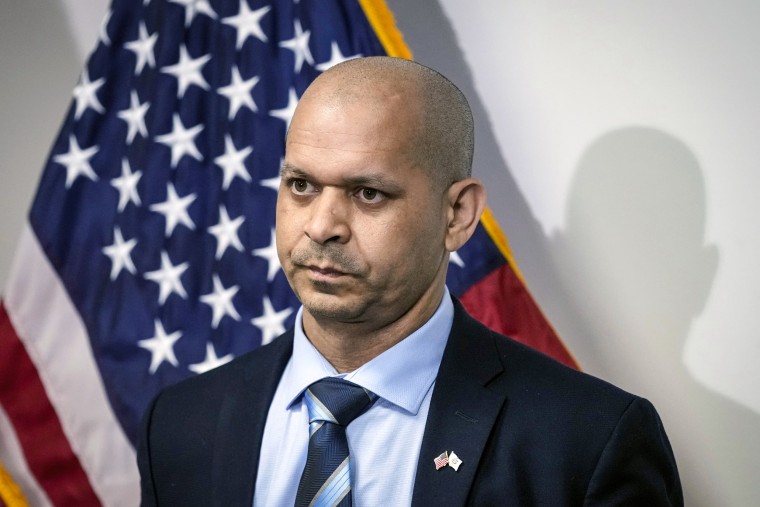
In his memoir, "American Shield: The Immigrant Sergeant Who Defended Democracy," Gonell writes about how the attack on the Capitol had tested him, and he contrasted the Jan. 6 actions with his loyalty to this country and its foundations as an immigrant.
He writes admiringly of the U.S. and of how he was able to rise from a poor household to be the first in his family to graduate from college, serve his adopted country and rise to become a sergeant in the Capitol Police. But he also devotes the second part of his book to the Jan. 6 attack, taking readers through the harrowing moments and how things escalated as Trump tweeted support for the rioters.
Gonell keeps pinned to the top of his feed on X, formerly Twitter, photos documenting the attack on him.
In the MSNBC interview, he remarked that in 2004 he was deployed to Iraq, where he said he fought for democracy.
"Here we are in the United States 20 years later and the party who sent me to Iraq (is) supporting someone who wants to be a dictator," Gonell said. "That should be striking and you should fear that because nothing good will come out of that."
Suzanne Gamboa is a national reporter for NBC Latino and NBCNews.com

IMAGES
VIDEO
COMMENTS
Du'a when visiting the sick. For those unfamiliar, Hisnul Muslim (Fortress of the Muslim) is a well-known du'a book compiled by Said Bin Ali Bin Wahf Al-Qahtani. It categorizes authentic supplications that the Prophet ﷺ made in various situations. In the 49th chapter, "When visiting the sick" there are 2 supplications that you can learn and ...
In the Islamic faith, the act of visiting the sick is a highly revered practice, one that holds immense spiritual, emotional, and communal significance. This comprehensive guide explores the profound dua (supplication) recited during these visits, as well as the etiquette and proper conduct expected of those who wish to provide comfort and support to the ill.
I ask Allah who is the Lofty and the Lord of the Mighty Throne that He cures you\n (Prophet Mohammad (SAW.) said that by reciting this dua seven times, the ill person will regain his health and if death occurs then that (death) is a different issue (i.e. death is written it cannot be prevented)) At-Tirmidhi 2:210. Read Duas about when visiting ...
Two Duas for Physical Sickness. One powerful dua for headaches and other physical sicknesses such as muscular spasms, bone pain, cuts and bruises is to rub your hand on the affected area and say the following: Allahumma Rabban-naas, azhibil-ba's, washfi antash-Shaafi laa shifaa'a illaa shifaa'uka, shifaa'an laa yughaadiru saqamaa.
Answer. Imam Bukhari (rahimahullah) has recorded this narration on the authority of Sayyiduna 'Abdullah ibn Abbas (radiyallahu 'anhuma). (Sahih Bukhari, Hadith: 3616) Translation. Do not grieve, insha Allah through this sickness you will obtain purity (from your sins) And Allah Ta'ala Knows best. Answered by: Moulana Suhail Motala.
The narrator said: Whenever the Prophet (ﷺ) entered upon a sick person to visit him, he would say: لاَ بَأْسَ طَهُورٌ إِنْ شَاءَ الله . This sickness is not harmful. Rather, it is a means of purification, if Allāh Wills. The sick bedouin responded saying: You said that it is a means of purification! No way!
Meaning. I ask Allah, the Supreme, Lord of the Magnificent Throne, to make you well. 2. Dua For Sick In Arabic. The dua for the sick in Arabic Text is, أَذْهِبِ البَاسَ، رَبَّ النَّاسِ، وَاشْفِ أَنْتَ الشَّافِي، لا شِفَاءَ إلَّا شِفَاؤُكَ، شِفَاءً لا ...
What are the manners of visiting the sick? Summary of answer. Visiting the sick is a confirmed Sunnah. The reward attained by the one who visits the sick is likened to the harvest reaped by one who gathers fruit. Answer. Praise be to Allah. Visiting the sick is called `iyadah in Arabic (from a root word meaning return) because people come back ...
At-Tirmidhi 2:210. Dua For Visiting The Sick. Ibn Abbas Radiyallahu Anhu reported: The Prophet SAW said, He who visits a sick person who is not on the point of death and supplicates seven times: As'alullahal-Azima Rabbal-Arshil-Azimi, an yashfiyaka (I beseech Allah the Great, the Rubb of the Great Throne, to heal you), Allah will certainly ...
Messenger of Allah (ﷺ) has ordered us to visit the sick, to follow the funeral (of a dead believer), respond to the sneezer (i.e., by saying to him: Yarhamuk-Allah after he says: Al-hamdu lillah), to help those who vow to fulfill it, to help the oppressed, to accept the invitation extended by the inviter; and to promote greetings (i.e., saying As-Salamu `Alaikum).
Dua When Visiting the Sick. Reading Dua When Visiting the Sick is simpler in Arabic with English translation. Supplication or Dua is like a special prayer for different times in life. The Dua When Visiting the Sick is a simple and powerful prayer with meaning, making memorizing easier.
Here are some Duas that we can recite when we are sick and when visiting the sick: 1) Dua for the sick Of course, when we are ill, we should seek medical attention - but we can also pray to Allah s.w.t. to help with our recovery. It is narrated that Aisha r.a. said that when anyone among them had an illness, the Prophet s.a.w. used to rub the ...
These duas are the following;1. According to the Sunnah, the visitor must lay a hand on the patient's body before making a dua for him. Recite this dua three times. As an alternative, you can recite the opening chapter of the Quran (al-Fatihah). Or the three chapters of the Qur'an known as al-Mu'awwidhat may be recited over the sick person.
The Sick. Dua when visiting the sick #1. Dua No: 134. لَا بَأْسَ طَهُورٌ إِنْ شَاءَ اللهُ. Translation. When the Prophet (peace and blessings of Allah be upon him) would enter upon a sick person, he would say, "No harm, may it (the sickness) be a purification (for you), if Allah wills.". Note: The excellence of ...
6 Dua When Visiting The Sick In English - 2. 7 Visit the sick - some labels. 8 Praise be to Alla. 9 Decision to visit the ...
5 - Dua When Visiting the Sick: When we visit a sick person, we say this special prayer, asking Allah to make them feel better. This dua is a kind and comforting gesture that reminds us of the importance of compassion and prayers in times of illness.
Listen the Dua Here: Islam The Ultimate Peace. Dua When Visiting A Sick. Islam The Ultimate Peace · Dua When Visiting A Sick. Transliteration:As'alullhal Azima Rabbal - Arshil-Azima an yashfiyak. Translation: I ask Almighty Allah, Lord of the Magnificent Throne, to make you well. (Recite seven times in Arabic .) Reference: At-Tirmidhi, Abu ...
Dua when visiting the sick. Ibn Abbas, Allah be pleased with him narrates that the Prophet, Allah send peace and blessings be upon him visited a sick Bedouin. Whenever he visited someone sick he would say. No harm will afflict you, it is a means of purification by Allah's will. و عن ابن عباس أن النبي صلى الله عليه ...
Indeed, adversity has touched me, and you are the Most Merciful of the merciful. 4) Dua for severe sickness. We often feel helpless when we visit sick persons either in our family or relatives. In this situation, try to remember that Allah is Ash-Shaafee (The One who cures, The Healer). Aisyah (RA) reported that: .
Dua of a sick person. Asalaam aleikum mufti saheb, There is one hadith (cant remember exactly which one), whereby we are told that the dua of a sick person is the same as the dua of the angels; thus we are encouraged to ask sick people to pray for us. My question is: what exactly does ' sick person' mean in this hadith?
Dua when visiting the sick #2. Dua No: 135. أَسْأَلُ اللهَ الْعَظِيمَ رَبَّ الْعَرْشِ الْعَظِيمِ أَنْ يَشْفِيْكَ (سبع مرات) Translation. Any Muslim slave (of Allah), who visits a sick person whose prescribed moment of death has not arrived (yet) and supplicates (seven times ...
For support and advice on help available from the government and charities when caring for a sick child visit: turn2us.org.uk
Aquilino Gonell, a former law enforcement officer who was nearly crushed to death on Jan. 6, 2021, at the hands of the mob that stormed the Capitol, still carries shards from the building's tunnel ...